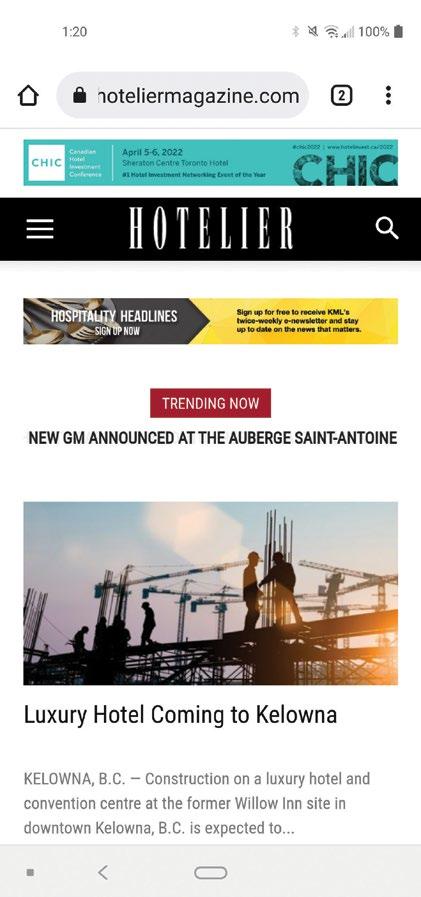












We are thrilled to announce the launch of our new midscale brands, StudioRes and City Express by Marriott, now available in the U.S. and Canada.
These brands leverage the trusted power of Marriott and provide owners the bene ts of:

• Bundled a liation costs for streamlined management
• Leading sales platforms to maximize your reach
• More direct bookings to enhance your revenue
• Economies of scale for cost-e ective operations

• Inventory stock readiness to meet demands e ciently
• Focused support & training to ensure excellence

• A tailored Marriott Bonvoy program for unparalleled loyalty bene ts
Discover the future of midscale hospitality with StudioRes and City Express by Marriott, where quality meets a ordability.


InnVest
Opal
48
Hotels and OTAs are putting their customer data to good use
Experts
insight into designing the perfect hotel suite
As we approach the end of 2024, it’s time to celebrate our annual Pinnacle Award winners (see profiles starting on page 12 ) and to mark the culmination of yet another year. By the time you receive this issue, the awards celebration will have come and gone, and another crop of stellar individuals and companies will have been fêted. This is a milestone celebration for KML’s awards program as we celebrate its 35th edition.
Now, with a new year only weeks away, I’m pleased to inform our valued readers about a change in our magazine format. As the digital world continues to evolve and become increasingly important, and after careful consideration and a thorough evaluation of the evolving media landscape, KML will be transitioning our two print magazines into digital-first publications. That means starting in January 2025, seven of our eight issues will be produced exclusively in digital format, with one issue — our October Who’s Who Market Almanac — continuing to be available in print.
As part of this transition, our digital platform will be enhanced to make reading more enjoyable, more convenient and more engaging. In essence, what was great is just going to be even better. Imagine having your favourite magazine at your fingertips, wherever you go. By fully embracing digital, it will allow us to better serve you with an enhanced and immersive reading experience. You’ll be able to access the latest issues instantly, eliminating the wait for delivery and you’ll be able to dive into a world of vibrant visuals, interactive content, and exclusive online features that will enrich your reading experience.
Why are we making this move? Simply stated, it’s about providing convenience through instant access, allowing subscribers to read the magazine anytime, anywhere — whether on a tablet, smartphone, or computer. Our magazine will always be within reach and you can access a library of past editions to refer to anywhere, anytime.
Of course, we’re also concerned about making a positive impact on the environment. By choosing digital, you’re helping us take a significant step toward reducing our environmental footprint and contributing to a more sustainable future with fewer physical copies to publish and distribute.
We’ll be able to provide you with enhanced and interactive content whereby you’ll be able to enjoy multimedia features, including videos, photo galleries, and clickable links that bring articles to life in a way print simply can’t match. And an immersive experience will be yours for the taking, while special promotions, bonus content, and interactive community will connect you with fellow readers and experts.
To continue to receive Hotelier in its new digital format, and take advantage of a new era of reading, we need you to update your reader information. Turn to p.9 of this issue and scan the QR code to continue to receive our magazine at no cost. As we know, change is the only constant in life, but we’re confident you’ll enjoy the changes. We look forward to having you join our growing community of digital subscribers who are re-defining how you engage with our magazine.
In the spirit of the season, on behalf of the entire KML team, we’d like to wish readers and advertisers alike, health, happiness and the best of the holiday season — and of course, a touch of magic. ♦

ROSANNA CAIRA
Editor & Publisher
AMY BOSTOCK
Managing Editor
NICOLE DI TOMASSO
Associate Editor
COURTNEY JENKINS
Art Director
JENNIFER O'NEILL
Production Manager
TYLER BECKSTEAD
Web Manager
JIM SZABO
Digital Marketing Manager
JANINE MARAL
Social Media Manager
WENDY GILCHRIST
Director of Business Development
DANNA SMITH
Account Manager
ZACK RUSSELL
Sales & Marketing Assistant
DANIELA PRICOIU
Senior Accountant
Andrew Weir, Destination Toronto; Anne Larcade, Sequel Hotels & Resorts; Bonnie Strome, Hyatt Hotels; Christiane Germain, Germain Hotels; Gopal Rao, Conestoga College; Hani Roustom, Friday Harbour Resort; Laura Baxter, Co-Star Reetu Gupta, Easton's Hotels; Ryan Killeen, The Annex Hotel Ryan Murray, The Pillar + Post Hotel; Stephen Renard, Renard International Hospitality & Search Consultants
HOTELIER is produced eight times a year by Kostuch Media Ltd., Mailing Address: 14 – 3650 Langstaff Rd. Ste. 33, Woodbridge, ON L4L 9A8, (416) 447-0888. Subscription rates: Canada: $25 per year, single issue $4, U.S.A.: $30 per year; all other countries $40 per year. Canadian Publication Mail Product Sales Agreement #40063470. Member of Canadian Circulations Audit Board and Magazines Canada. Printed in Canada on recycled stock.
All rights reserved. The use of any part of this magazine, reproduced, transmitted in any form or means, or stored in a retrieval system, without the written consent of the publisher is expressly prohibited and is an infringement of copyright law. Copyright, Hotelier 2024 ©
Return mail to: Publication Partners 1025 Rouge Valley Dr., Pickering, Ontario L1V 4N8

AN ESSENTIAL TORONTO EXPERIENCE THAT IS UNIQUELY YOURS.
JOIN US ON FAIRMONT GOLD FOR AN ELEVATED, PERSONALIZED STAY.
FAIRMONT ROYAL YORKDOWNTOWN TORONTO LUXURY HOTEL























Hilton partners with Be My Eyes to enhance accessibility
HBe My Eyes is available across a variety of Hilton’s portfolio of brands, including Waldorf Astoria Hotels & Resorts, Conrad Hotels & Resorts, DoubleTree by Hilton and Hampton by Hilton, among others.
ilton has partnered with Be My Eyes to ensure guests who are blind or have low vision can experience a more accessible, seamless and welcoming stay across the U.S. and Canada. Be My Eyes is a free mobile app that connects blind and low-vision users with sighted volunteers and companies through live video and AI, and now, directly connects guests with a team of dedicated, specially trained English-speaking Hilton Reservations and Customer Care agents.
“Our mission at Be My Eyes is to break down accessibility barriers in everyday life, and this partnership with Hilton is a significant step along that path, helping travel and hospitality to be much more inclusive,” says Mike Buckley, CEO, Be My Eyes.
Be My Eyes users can use their smartphone to navigate to the service directory and select the hotels category and choose the participating Hilton brand to be directly connected to its dedicated teams. The teams will be available to help guests navigate the hotel, including helping them identify and adjust the in-room thermostat, operate in-room coffee machines, identify window coverings, or navigate to the hotel’s meeting spaces and amenities, such as bars, restaurants, gyms or spas.
Hilton first partnered with the organization in 2023 to train and improve Be My AI, an OpenAI GPT-4 language model that powers the Be My Eyes app, to enhance its ability to recognize objects and navigate the furniture and fixtures found in Hilton brand hotel rooms.
In addition, guests can take advantage of Hilton’s “straight-to-room” digital self-service tools. Where available, these tools include the ability to choose your room, digitally check in, use the Digital Key to open guestroom doors with mobile phones and digitally check out.
“Hilton is committed to creating an experience that’s welcoming for every guest, at every hotel, every time,” says Mike Gathright, SVP, Customer Excellence and Innovation, Hilton. “We believe that every guest — regardless of ability or any other factor — deserves a reliable and friendly travel experience, and we’re proud to partner with Be My Eyes to make that more of a reality for thousands of Be My Eyes users.” ◆♦


The Ritz-Carlton, Toronto has appointed Lukas Boeckmann as its new general manager. The role was previously held by Guillaume Benezech, who has since transitioned to another role within Marriott.
After completing a $25-million facelift in 2023, the Chelsea Hotel, Toronto has launched another multimillion-dollar renovation.
The 2024 investment included 993 guestrooms in the Chelsea Tower, as well as extensive upgrades to all function, meeting and banquet facilities. With a total investment close to $60 million, additional refurbishments scheduled for 2025 include a renovated lobby and new lobby bar.
Pan Pacific Whistler Mountainside has been named Canada’s Best Ski Hotel in the 2024 World Ski Awards, marking the 12thconsecutive year the hotel has received the esteemed award.
Since launching in 2013, the World Ski Awards remains the only global program to celebrate and reward excellence in ski tourism, recognizing organizations standing out as leaders in the ski industry. Award categories for the world’s leading ski tourism destinations include Best Ski Hotel, Best Boutique Ski Hotel, Best Ski Chalet and Best Ski Resort.
“We’re thrilled and truly grateful to be recognized as Canada’s Best Ski Hotel for the 12th- consecutive year,” says Julie Lanteigne, GM of both Pan Pacific Whistler Mountainside and Pan Pacific Whistler Village Centre hotels. “We want to thank our dedicated team for consistently delivering a memorable experience for our guests every day, and we also extend our gratitude to everyone who took the time to vote for us. We look forward to honouring this award and continuing our commitment to quality service through this winter and beyond.”
Destination Original Indigenous Tourism (DO-IT) recently formalized its partnership as the American Indian Alaska Native Tourism Association (AIANTA). The Indigenous Tourism Association of Canada (ITAC) and New Zealand Māori Tourism entered a commitment pledge partnership at AIANTA’s 26th-annual American Indigenous Tourism Conference, hosted by the Tunica-Biloxi Tribe of Louisiana in Marksville.
O-IT aims to unify the collective voice for Indigenous tourism worldwide and the Indigenous peoples it comprises. Its mission is to support a sustainable, thriving Indigenous tourism economy sharing authentic, memorable and enriching experiences.














Sonesta knows that one size doesn’t fit all. Discover the newest additions to Sonesta’s Luxury & Lifestyle portfolio: Classico + MOD. These distinct collections of independent hotels reimagine Sonesta hospitality using a design-forward filter. At Classico, good taste emanates through refined interiors and traditional high-touch service, while MOD caters to the contemporary traveler’s penchant for eclectic décor and curated food and beverage. Brought to you by owners who know what it means to own, invest in, and operate powerful brands that can help you stand out from the competition and grow.






BY CAYLEY DOW

eing a hotel leader is challenging. I remember my days were often characterized by my rotating office door and urgent requests, each more pressing than the last. I both loved and loathed those days, yet one guiding principle kept me grounded: choose the right people for the right roles. I was confident if I did nothing other than hire and engage them well, then everything else would fall into place. This may sound easy in theory, but in practise it’s not. Here’s what I’ve learned about engaging the best hires and keeping them.
There are specific traits you should look for in your next hires.
1. Emotional Intelligence (EI) EI is linked to higher performance, especially where frequent guest interaction is needed. People with high EI are better problem-solvers and have a stronger capacity for teamwork.
2. Accountability. Accountable employees are 28 per cent more productive, they show ownership over their work and they elevate team performance.
3. Passion. A passion for the mission is essential to upholding brand values. For example, Marriott has seen success in sustainability by hiring employees who value environmental impact, driving engagement and brand awareness.
4. Life-long Learning. A hunger for lifelong learning builds adaptability to change and resiliency. A Deloitte study shows that organizations with continuous learning cultures see a 30-per-cent higher retention rate.
When you hire for the right qualities, recognizing great behaviour becomes straightforward. Intelligence shows when an employee doesn’t just solve a guest issue but addresses the root cause to improve future experiences. Accountable employees follow through, own their tasks, say “I’ve got you”
and aren’t afraid to admit mistakes. Passionate team members go above and beyond, volunteering for projects or bringing fresh ideas outside of their job scope. Life-long learners have a growth mindset and see failures as learning opportunities. Rewarding great behaviour can be as simple as saying “great job” or as big as a promotion — what matters is showing recognition in a way that resonates.
Gen Z, born between 1997 and 2012, will soon make up more than 25 per cent of Canada’s workforce, with a strong presence in hospitality. A 2023 Deloitte report found that 50 per cent of Gen Z rank work-life balance as a top priority, valuing flexibility and purpose over traditional perks like salary. In fact, 60 per cent of employers report challenges with Gen Z employees around work-life balance expectations. Instead of seeing these as drawbacks, consider how they may benefit your team. Outdated systems might hold back your Gen Z hiring, so aligning your company’s goals with mentorship opportunities and community values can turn them into loyal team members.
People are the heart of any hotel, but keeping the right talent isn’t always easy, and turnover can feel like a constant drain. Whether you’re a new or seasoned leader, these lessons will help you focus on what matters most — hiring and keeping the right people.

As the digital world continues to evolve and become increasingly important, and a er careful consideration and a thorough evaluation of the evolving media landscape, KML will be transitioning Hotelier magazine into a digital- rst publication. at means that starting in January 2025, seven of our eight issues will be produced exclusively in digital format, with one issue — our October Who Owns What issue? — continuing to be available in print. As part of this transition, our digital platform will be enhanced to make reading more enjoyable, more convenient and more engaging.











What was good just got better! Imagine having your favourite magazine at your ngertips, wherever you go. By fully embracing digital platforms it will allow us to better serve you with an enhanced and immersive reading experience. With a digital subscription, you can access the latest issues instantly, eliminating the wait for delivery. Dive into a world of vibrant visuals, interactive content, and exclusive online features that enrich your reading experience.
To ensure you continue to receive Hotelier in its new digital format, while embracing a new era of reading, we need you to complete the following subscription information.
Join now for a time-limited o er to continue to receive Hotelier at no cost.
*A er March 1, 2025, subscribers can join by becoming a member of the KEY Club at a preferred rate o ering a range of perks and access to enriching content across multiple platforms. Stay tuned for more information, coming soon!
Join our growing community of digital subscribers who are re-de ning how you engage with our magazines. Transform your reading experience — subscribe digitally now and discover all the advantages that await!
Your next adventure is just a click away.
Segmentation recommendation engines
appear to be the next big AI tool for hotels
BY ADAM AND LARRY MOGELONSKY
has been critical from Day 1 for the modern hotel industry. More recently, with numerous data sets being merged due to technological advances, brands are starting to get granular with their KYC (know your customer) in terms of understanding where guests are coming from, why they’re selecting your property, and what their buying.
Layering on AI tools on top of this data can now allow hotels to do far more within this burgeoning field of micro-segmentation.
To start, we must grasp how all this data is coming together. In contrast, with the dawn of application programming interfaces (APIs), disparate systems used by different operations could be strung together by structuring data field imports into a centralized storehouse. The PMS has always been a likely candidate for this nexus.
Common friction points for working with APIs has been that IT professionals need the spare time to set up each interface and maintain all established connections with each subsequent software update. With each new system added to the tech stack, this quickly becomes resource-intensive. A specific type of AI called robotic processing automation (RPA) has already proven itself by acting as a robot that can directly replace double entry work that has to be done manually because two systems haven’t been integrated to talk directly to each other.
Once you have all this data imported, cleaned and structured into proper data fields, you now have an enormous treasure trove of numbers. While this database is far too vast for a pair of hotelier eyes to pick out patterns, the AI specialty of machine learning (ML) is designed precisely for that task. The more data you give it, the more patterns it can potentially find and the more accurate its predictions will be.
The key to ML is that it can produce a predictive model to optimize for desired future outcomes. Then, once that model is tested out in the field, the best AIs can use the new data as feedback to improve their own modelling algorithm, further
enhancing their predictive power to better optimize for a stated objective.
Hotels have already seen lucrative applications for ML in the Revenue-Management System (RMS), where massive data sets comprising external and internal inputs are computed into an algorithm that can recommend pricing for rooms revenue, occupancy or total revenue per guest stay.
It’s this notion of recommendations that brings us to the concept of having ML interpret not only how to adjust nightly rates or what response to provide for a website chatbot, but also to look at the multitude of guest profile data and then come back with its own set of micro-segments for your revenue, sales and marketing teams to interpret and pivot their planning accordingly.
Currently, all of us are operating under a given set of established business assumptions based on how we were trained and our experience working in hotels. We see the world in terms of leisure, corporate and groups, and many of us have become locked into these guest segments. Recommendation engines based on ML don’t have those same limitations and thus can provide a fresh set of eyes on what your real segments are. ♦
Larry and Adam Mogelonsky are partners of Hotel Mogel Consulting Limited. You can reach Larry at larry@hotelmogel.com or Adam at adam@hotelmogel.com

Opal Hospitality
Regional Company of the Year
Josef Ebner
Lifetime Achievement Award





Avendra International is a leading partner in strategic procurement and supply chain management, serving a diverse array of organizations including hotels, hospitality and leisure resorts, healthcare, and educational institutions worldwide. Whether clients seek to reduce costs, boost efficiency, drive innovation, or meet sustainability targets, our tailored solutions, advanced technology, and industry expertise empowers organizations to thrive.
Global Procurement. Local Expertise.





BY JENNY FEBBRARO
It’s an award that celebrates a life’s worth of dedication.
Recently retired, Josef Ebner, regional VP, Canada & managing director at Langham Hospitality Group, Chelsea Hotel Toronto, is this year’s winner of Hotelier’s Rosanna Caira Lifetime Achievement Award.
“This award is truly one of the greatest honours I ever could have received,” says Ebner, who has been a leader with the Chelsea for the past 32 years. “I’m also very proud of what we have achieved as a team at the hotel, especially through the most challenging times.”
Ebner’s reputation precedes him in the hospitality industry, with 60-year career spanning 14 properties and seven countries. His accolades include awards from the Hotel Association of Canada, Canadian Hotel and Marketing Sales Executives, the Greater Toronto Hotel Association, the Tourism Industry Association of Ontario, and perhaps most personal for the Austrian native, the 2011 Decoration of Honour in Gold from the Province of Styria, Austria.
“With genuine passion, Josef Ebner has inspired, shared and developed a vision for the future of the Chelsea Hotel and the tourism industry,” says Rob Housez, general manager, Chelsea Hotel, Toronto. “Whether tending to his guests or
employees, the needs of the owners of Canada’s largest hotel, and contributing to promoting Canada as a destination, he represents the definition of a leader and a master hotelier. On behalf of the team at the Chelsea, we wish him all the best in his well-deserved retirement.”
During the 1960s, an early start in an Apprenticeship Training program for becoming a waiter shaped Ebner’s view of the hotel industry early on. “When you’re a waiter, working at the service level, people do not hold back their opinions,” says Ebner. “There is no filter. You hear what people on the ground really think. That’s where I learned that success begins with treating all staff with respect and dignity.”
With a focus on improving customer service and relationships between and amongst staff, Ebner was able to transform the then Delta Chelsea during a challenging moment in its evolution.
In the early ’90s, Ebner worked at a Renaissance hotel in Washington. “I got the call and moved to Toronto and haven’t looked back since,” he says. “Promoting Toronto to the world as a great tourist destination has been one of the key factors in our success. We travelled all around the world, including China, Korea, Japan, all over Asia, Europe, the UK and the

Middle East at various Showcase events.”
Ebner explains that the in-person contacts created essential personal relationships that are so critical to the hospitality industry. “Human connection makes all the difference and visiting these places internationally is the best way to promote Canada, and Toronto specifically.”
“The Delta Chelsea needed revamping at the time and I was tasked to do it,” says Ebner. “When I first came in, there were a lot of union complaints, over 200 grievances filed by hotel staff.” Other organizational challenges included insane lineups. “There would be lines all the way to Bay, Gerrard and Yonge Street.” Just checking into the hotel required a massive re-organization. But rather than solve the problem on his own, Ebner consulted the staff to collaborate on a better system. Separate check-in areas for separate groups streamlined the enterprise and reduced wait times.
In addition, Ebner arrived at a time when staff turnover was astronomical. “It was like a revolving door,” he says, laughing. “But by creating personal relationships with staff — and treating them with respect, that is how you ensure staff loyalty. That loyalty towards the hotel then becomes a personal loyalty. They too, are invested in it.”
While hotels have an average staff turnover rate of 25 to 30 per cent, the Chelsea, under Ebner’s leadership, has reduced that number to 10 to 12 per cent: “People stay because they like their workplace, they have built connections there. We are



It was like a revolving door. But by creating personal relationships with staff — and treating them with respect, that is how you ensure staff loyalty. That loyalty towards the hotel then becomes a personal loyalty. They too, are invested in it
















really more like a family.” Ebner says that 35 per cent of the staff has been there for 25 years or longer.
Ebner also brought in greater revenues by taking a unique approach — he became a part of the sales team. “I did not officially work in sales, but I worked directly alongside them and with them,” he says. “As a team, I led us to greater sales and built relationships there.” In doing so, he came to befriend the hotel’s owners. “You want to have happy owners when you are in upper management,” he explains. “So better revenues, among other things, helps that. But again, this is all a part of building relationships, which is at the core of everything.”
His strategy became reducing expenses and increasing training. Initially, Ebner took a hard look at the annual budget and cut $1,000,000 from payroll. Following that, he sought to bring the then three-star hotel to a four-star rating. “We succeeded, but not without a lot of work — and I attribute that to everyone’s hard work and co-operation,” he says. “We spent $100,000 on staff training that year and we continue to do so. Regular training is a huge component of service excellence.”












It’s that consistent, dependable excellence in service that creates return visitors, he says. Ebner notes that service must be the focus of the hotel, especially since guests were not automatically drawn there for conventions. “We did not have the facilities to host conferences, like so many hotels, though we have a number of regular business guests who choose to stay here when they come to Toronto,” he says. “Once you become known for the quality of service — that’s what keeps their business.”
On behalf of all of us at Tarpon, I want to extend my warmest congratulations on receiving the prestigious Lifetime Achievement Award. This incredible honour is a testament to your dedication, vision, and exceptional contributions to the hospitality industry, particularly through your work at the Chelsea Hotel in Toronto.
Your leadership, commitment to excellence, and passion for creating memorable experiences have left a profound impact on colleagues, guests, and the broader community alike. This award not only celebrates your remarkable career but also highlights the countless lives you have touched throughout the years. Thank you for your unwavering dedication, and congratulations once again on this well-deserved recognition. Here’s to continued success and inspiration in all your future endeavors!
With warm regards, Tarpon
Contracting Martin PresidentRaus

www.tarponcontracting.com
Greg Budzalewicz, Vice-president, Construction greg@tarponcontracting.com (905) 608-0499 x 150
Ebner’s leadership became especially critical during crisis moments in the hospitality industry, including the recent COVID-19 pandemic of. “Oh, that was a hell of a lot of fun,” laughs Ebner. “But you have to remember, we had to deal with SARS way back, so we had experience in other tough times. Then, of course, we had 9/11, which was a real hit to the industry, then the financial meltdown of 2008/2009.” During COVID, Ebner says the hotel was able to retain approximately 150 staff and maintain approximately eight to nine per cent occupancy. “There are unpredictable moments, but we got through them,” he says.
Bob van den Oord, CEO, Langham Hospitality Group, commends Ebner for his industry leadership. “There have been many milestones over the course of Josef’s hotel leadership of the Chelsea over the past 32 years, including the transition of the hotel from Delta Hotels to Chelsea (under direct LHG management) 11 years ago,” says van den Oord. “One of our strategic objectives and goals relates to “The World - To Create a Net Positive Impact” and I have not met anyone who exemplifies this more than Josef. The ability to ‘give back’ to the community is not only an important philosophy of Langham, but it is something he personally practices every day.”
Ebner’s commitment to charity is unmatched in such a profit-driven industry. Massive fundraising campaigns were held for a variety of national and international charities, including the Juvenile Diabetes Foundation, Special Olympics
Canada, and Habitat for Humanity. Since 2013, the hotel has donated more than $1 million in support of SickKids Foundation. On a personal challenge, he raised money by climbing mountains such as Kilimanjaro — $30,000 for Special Olympics — and Aconcagua — $25,000 for the Jane Goodall Institute of Canada.
“Giving back to communities has always been one of the contributions I am most proud of,” says Ebner. “That is what it’s all about, especially to the next generation.” Ebner contributed to many tourism-related student/youth programs and, for Cornell University, acted as a mentor to the Masters students. Locally, he sat on the Dean’s Advisory Council at the Ted Rogers School of Management, at Ryerson University. He also worked closely with many European tourism-management schools that provide internships and personally mentors many of the students himself.
As for what he plans for his retirement, Ebner says he still has a few items to check off his bucket list. “I have travelled the world quite a bit, but I would like to spend more time with my family,” which he says includes his wife Annette, daughter Brigitte, and son-in-law and grandkids. “I may climb mountains again,” he says. “My father used to climb mountains and I enjoy doing that as well.”
Despite his professional accomplishments, Ebner continues to express gratitude for all his experiences and opportunities, especially his Toronto ones: “I’ve been a lucky guy to run the Chelsea hotel,” he says.♦




BY DANIELLE SCHALK
Toronto-based InnVest Hotels has a long and rich history in Canada’s hotel industry, which began in 1978 with a single Journey’s End Motel. In the decades since, the company has gone through several iterations on its way to becoming the multifaceted hospitality player it is today and the largest owner and operator of hotels in Canada.
From that first property, Hotelier’s Company of the Year, grew its presence in the market and eventually went public in 1986 as Journey’s End Corporation. It went on to acquire Commonwealth Hospitality and a 50-per-cent stake in Choice Hotels Canada in the early ʼ90s. Then, in 1999, the company (then Unihost) was acquired by Goldman Sachs and the Westmont Hospitality Group before being taken public again, as InnVest REIT, in 2002.
The company became InnVest Hotels after its acquisition by Bluesky Hotels in 2016 and since this time, InnVest has worked to re-define its corporate strategy, with a focus on vertical integration and developing its internal culture.
As part of this pursuit, the company began to internalize management of its hotel operations in 2019 with the establishment of InnVest Hotels Management Limited (now iHotels Management).
Adding the majority of the company’s owned properties to the roster, as well as a number of third-party contracts, iHotels now manages more than 85 hotels.
And, as Lydia Chen, president and CEO of InnVest Hotels notes, the company has continued to make a number of key changes to its business model in recent years.
Continuing its pursuit of a vertical integration model, the company introduced a construction and renovation division — Trip Contracting — in 2022. Under this umbrella, George Kosziwka, Chief Strategy Officer of InnVest Hotels, notes, “We do renovations and project management for ourselves, but we have also done a number of renovations for third parties.”
A number of notable acquisitions in the last few years has meant there is no shortage of renovation work to be done. Because, as Jeff Hyslop, the company’s senior vice-president of

Asset Management, notes, “All the assets we acquire tend to have opportunity on the renovation side.”
In 2022, InnVest made its first foray into the Canadian resort market with the acquisition of two resorts in Banff, Alta. (the 99-room Royal Canadian Lodge and 65-room Charltons Banff). And a subsequent deal in fall of 2023 marked another milestone for the company as its official entry into the U.S. market.
“[This acquisition] is a significant step for InnVest’s strategy to expand our portfolio outside of Canada,” says Chen. “We are one of the largest hotel companies in this country. However, our ambitions lay not only within Canada. We want to eventually grow to the global market.”
And, while the 189-room Kimpton Hotel Monaco in Seattle, Wa. is just a first step toward these ambitions, the company is happy to take its time and get its bearings before taking a second.
“When we get into new markets, we
Congratulations to InnVest
on your Pinnacle Award for Hotelier’s Company of the Year!


This recognition reinforces your position as an industry leader, reflecting your immense commitment to hospitality and support of the 100+ Canadian communities where you operate properties.










need to take time to learn,” Chen explains.
The InnVest team followed this up with additional Canadian acquisitions, starting with an iconic east coast resort, the Algonquin Resort St. Andrews by-the-Sea, Autograph Collection and The Algonquin Golf Course, which marked its third resort and first golf-course property.
Then, early this year, the company made a big move — completing its largest acquisition since 2007. This deal saw InnVest purchase 10 of 14 former Morguard Corporation hotels. These new additions, located in Ontario and Halifax, comprised 1,737 guestrooms and 40,000 sq. ft. of meeting and convention space.
And, while the remaining four hotels were acquired by Torontobased Manga Hotel Group, these were also brought under the management of iHotels.
Finally, to top things off, InnVest acquired the 99-room Banff Inn, located in the centre of Banff, Alta., this June.
As the company has grown and evolved, the strength and dedication of InnVest’s teams has been pivotal to ensuring its success.
And this, Hyslop explains, has been possible thanks to a commitment to fostering a healthy internal culture, which truly starts at the top. “Since we were privatized and Lydia’s been at the helm as CEO and president, she has really connected with the executive team and all our leaders in the field in a way that, I would say, is irregular in the industry,” he shares. “That is what
Since we were privatized and Lydia’s been at the helm as CEO and president, she has really connected with the executive team and all our leaders in the field in a way that, I would say, is irregular in the industry

[has driven] the organization forward and outward over the last eight years.”
This dedication is perhaps best captured in InnVest’s core values framework, known as TRIP — teamwork, respect, integrity and performance.
“This is something that Lydia came up with, [along] with our values and our mission statement,” explains Kosziwka. “Those are the four pillars that, as an executive team, we try to live every day. And, we try to show all our people that head office and all of our general managers are walking the walk.”
Kosziwka also points out that this strong internal culture forms a key selling point for iHotels Management. “We have a great platform, [but] we also have the ability to hire one of the best and brightest GMs for you, and having a very successful hotel starts with having a very high-quality general manager,” he says. “There’s just no other platform that does everything that we do with the quality of people that we have.”
“Our goal is to be the one of the best employers in the country,” Chen adds. “We’re continuing to develop and invest in our people and are really trying to hire the best talents to join our company.”
With the growth of InnVest’s team across the country — the Morgaurd acquisition alone adding 766 new team members to the organization — the leadership team has identified an

opportunity to create a sense of unity and focus within its charitable efforts.
“Every year, the company — including our hotel teams — commits 5,000 to 6,000 hours of volunteer work as a company,” explains Chen. This includes a number of propertylevel efforts undertaken by its hotel teams across the country.
To create a more unified approach, the company launched the “InnVest in Community” initiative at its 2024 GM conference in May, where a national charity partner was selected as the main focus of InnVest’s 2024-2025 communitysupport efforts.
“We wanted it to be a ground-up approach to determining who we were going to support,” Hyslop explains. “We allowed all our hotel leaders to submit proposals on charities that they’re passionate about within their communities.”
This resulted in 38 submissions, which were narrowed down to a top three, focusing on national charities the executive team felt were the best fit. “Then we had presentations on those specific charities at the general managers conference,” Hyslop adds.
This process culminated in a live vote, which saw Food Banks of Canada selected as the InnVest in Community initiative’s inaugural charity partner.
“We have a number of activities planned, starting this fall,”









Hyslop explains. “We’re going to do a number of initiatives to support Food Banks of Canada and local food banks in every community.”
As InnVest Hotels sets its sights on the road ahead, Hyslop identifies Victoria and Montreal as key domestic markets the company has an eye on. However, he notes, “Our plan is to focus more on opportunities in the U.S. over the coming years — this would be the next horizon, from a growth perspective.”
However, he also notes that the company sees “an opportunity to leverage its platform to asset manage thirdparty capital in the space.”
“There’s institutional investors, and other investors that aren’t comfortable directly owning within the hotel space that we can partner with on opportunities,” Hyslop explains.
The company also continues to grow its portfolio of managed properties, with an eye on becoming a leader in the hotel management space. Satinder Dhillon senior vice-president, Operations, notes iHotels is well on its way to reaching its current goal of managing 20 properties for third-party owners.
“We have 12 [third-party] hotels under management at the moment and I have about 20 hotels in the pipeline in various degrees of negotiation,” Dhillon said in September. “As we manage 80-odd hotels, we [have demonstrated that] we have the strength to really bring a lot to the table.”♦













At Sealy Canada, we extend our heartfelt thanks to InnVest Hotels for their valued partnership throughout 2024. Together, we’ve delivered exceptional comfort and a great night’s sleep to all their hotel guests. Here’s to many more restful nights ahead!
















BY NICOLE DI TOMASSO
Leaders in the development and management of hospitality spaces, Mississauga, Ont.-based Opal Hospitality — Hotelier’s Regional Company of the Year — has been led by founder and president Perry Vashee since its inception in 2018. The company began with the purchase and re-positioning of a hotel in St. John’s, Nfld., which now operates as a DoubleTree by Hilton. The company’s leadership team delivers a full range of services, including hotel management, asset re-positioning, brand-product development, strategic consulting, and project management.
“We work closely with both brands and property owners to tailor our operational techniques to the unique needs of each property,” says Vashee. “By maintaining strong, ongoing relationships through consistent in-person visits and a substantial on-property presence, we ensure efficient management and operational success across our diverse portfolio. This approach not only enhances the performance
of our properties, but also strengthens our partnerships with leading brands, setting a high standard for operational excellence in the industry.”
In the last year, the company’s portfolio has grown from six to a total of 14 operating and developing properties. In addition to the DoubleTree by Hilton St. John’s Harbourview, its current portfolio also includes Bloom Mississauga, Tapestry Collection by Hilton; The Insignia Hotel, Sarnia, a Tribute Portfolio Hotel; Canvas Moncton, Tapestry Collection by Hilton; Best Western Plus Parry Sound; Fairfield Inn & Suites Toronto Brampton; The Wellington Hotel (Prince Edward County, Ont.); Railwayparc Hotel, Tapestry Collection by Hilton; Hyatt Place Windsor; Fairfield Inn & Suites North Bay; Fairfield Inn & Suites Barrie; Comfort Suites Spark by Hilton; and Hampton Inn Wasaga Beach.
“We’ve successfully introduced and managed new brands, including Hyatt, Best Western, and Choice Hotels, in addition to our existing Hilton and Marriott partnerships,”

says Vashee. “This expansion has brought new properties to key locations such as Montreal, Wasaga Beach, Ont., Ottawa, North Bay, Barrie, Parry Sound, and Windsor, Ont. We’re also actively planning further expansion into the U.S. market to seize emerging opportunities.”
Vashee says The Wellington Hotel and the Railwayparc Hotel, Tapestry Collection by Hilton are both currently under development and expected to open next year.
“[The Wellington Hotel] is a small luxury boutique hotel will feature a restaurant that focuses on locally sourced, farm-totable cuisine,” says Vashee. “The hotel will also include a host library bar with a nostalgic ’50s and ’60s theme, as well as a rooftop patio, further enhancing its appeal to both guests and the local community.”
Overall, Opal Hospitality’s operating properties have been performing well. “Over the past year, the company’s sales and profits have remained relatively stable, with no dramatic increases. This reflects a consistent performance without significant growth fluctuations,” says Vashee. “We’re focused on maintaining steady operational excellence and strategic initiatives to drive future growth.”
As part of maintaining its strategic initiatives, the company evaluates several key areas to ensure its hospitality spaces are exceptional, including design, training, and emerging trends.
“Firstly, [the space is] designed with a user-centric approach, ensuring it meets the practical needs and
preferences of guests rather than merely prioritizing visual appeal. This involves meticulous attention to detail, where every aspect of the space is thoughtfully considered to enhance the overall guest experience,” says Vashee. “Additionally, effective staff training is crucial, as it ensures that service levels align with the design and operational objectives of the space. The space should facilitate a high level of service that complements its functional aspects.”
He says understanding how the space will be utilized is essential, focusing on its practical applications rather than just its aesthetics. “It’s also important to address market needs and incorporate emerging trends that have a meaningful impact on guest satisfaction. Knowing the target customer and their evolving preferences plays a significant role in shaping an exceptional hospitality environment.”
The integration of advanced technology and the transformation of hotel common areas into bustling community hubs are two major industry trends that Opal Hospitality is staying in front of.
“Guests today have heightened expectations influenced by their experiences at home, leading to an increased demand for seamless, technology-driven services,” says Vashee. “The transformation of traditional lobby breakfast areas into vibrant social community hubs fosters a more engaging and interactive environment. Our company is proactively addressing these trends by adopting cutting-edge technology and re-imagining

Guests today have heightened expectations influenced by their experiences at home, leading to an increased demand for seamless, technology-driven services
actively contributing to the community through several impactful initiatives. At DoubleTree by Hilton St. John’s Harbourview, the company hosted a “Dinner for Fang” event in honour of a colleague who passed away from diabetes complications. The event raised $3,260 for Diabetes Canada. Additionally, Canvas Hotel in Moncton launched a training and employment program for Syrian and Ukrainian refugees, highlighting the company’s dedication to supporting displaced individuals and making a positive difference in the community.
Looking ahead, in June 2025, Opal Hospitality has scheduled a charity golf day, with all proceeds going to local charitable organizations. The company is also in the process of planning various other charity events across its hotels.
The company aims to have 25 hotels and between five and 10 restaurants in its portfolio by 2030.
our communal spaces to align with contemporary guest preferences, thereby ensuring that we meet and exceed evolving expectations.”
At DoubleTree by Hilton St. John’s Harbourview and Canvas Moncton, for example, guests are treated to a multisensory experience upon arrival. Resto-bar concepts occupy lobby spaces, emerging as the focal point of design.
Over the past year, Opal Hospitality’s properties have reached remarkable milestones and received notable industry recognition, reflecting its substantial growth and influence in the industry.
“The Marriott Summer GSS Competition, a 10-week challenge aimed at enhancing year-to-date (YTD) ITR scores, showcased the exceptional performance of our hotels,” says Imran Mangalji, corporate director of Operations, Opal Hospitality. “Insignia Hotel earned second place among 38 competitors in the Boutique and Luxury category, reflecting a 1.6-point increase in ITR. Fairfield Inn & Suites Toronto Brampton excelled by securing first place among 31 peers in the Fairfield category, with a significant five-point increase in ITR. Fairfield Inn & Suites Barrie achieved third place in the same category with a 1.8-point increase, while Fairfield Inn & Suites North Bay earned eighth place, demonstrating a 0.7-point increase in ITR. Notably, Fairfield Inn & Suites Toronto Brampton also ranked third among all Marriott hotels in Canada (273 properties) in the Summer Booster Challenge, which measures overall ITR growth and meeting YTD Bonvoy Enrollment Targets.”
Mangajli continues, “In the broader context of overall ITR rankings, Fairfield Inn & Suites North Bay was recognized as 25th out of 273 Marriott hotels in Canada, while Insignia Hotel secured 51st place. Fairfield Inn & Suites Toronto Brampton made significant strides, improving from 167th out of 212 to 109th out of 273 Marriott hotels in Canada.”
In addition to its ongoing commitment to exceptional service and industry excellence, Opal Hospitality has been
“Looking ahead, our strategic goals for the next five years include expanding our management infrastructure and significantly growing our hotel portfolio,” says Vashee. “We aim to enhance our market presence by focusing on the lifestyle-hotel segment, which aligns with current industry trends and guest preferences. By advancing our management capabilities and broadening our portfolio, we seek to drive sustained growth and deliver exceptional hospitality experiences that resonate with contemporary travellers.”♦
























BY ROSANNA CAIRA
When Madone Pelan assumed the role of director of Sales at Victoria’s beautiful and historic Oak Bay Resort Hotel in 2015, the hotel was in receivership. “It was a challenging time in the industry and it had just re-opened after being closed for six years,” says the native of Powell River, B.C. Formerly owned by the Walker family of B.C., by the time Pelan arrived, the hotel was sold to two investors — Rev Investments and J.V. Driver (earlier this year J.V. Driver became the sole owner). Instead of letting the financial challenges deflate her efforts, she saw it as opportunity. “It gave us a chance to start fresh and have re-investment and support there,” says this year’s Hotelier of the Year award winner, recalling those early days. “We re-built from there and there was nowhere but up at that point, so it was really exciting and a great place to start from.”
Having worked for a variety of big hotel brands, most recently at the venerable Fairmont Empress Hotel, Pelan welcomed the opportunity to transition to an independent. “Because we’re an independent property, we had the ability to test and try and really be adventurous in our approach to different things,” she says, noting “sometimes in a brand
setting you can be limited working within the parameters. We had no brand or structural template and everything was built from scratch, which was a lot of work, but it allowed us to customize everything we did in a way geared to customer service and our guest.”
With a key focus on wellness for its guests, the100-room Oak Bay Beach Hotel is nestled on the shores of the Pacific with stunning sea views of Victoria. It taps into a predominantly leisure traveller with a focus on romantic getaways, girls’ getaways and milestone celebrations. “We are known for our annual Wellness Retreats in February, which guests now request to re-create privately for them,” says Pelan. “Many of our guests want to align their travel with their values and look for sustainability and corporate social responsibility when they’re choosing how to spend their travel dollars.”
What makes the hotel special, says Pelan is “It combines the best of everything. It has a wonderful history, a luxury-resort feel and heated mineral pools overlooking the Salish Sea.”
It’s a magical location, she says, featuring a temperate climate and great culinary offerings. Large enough to feature four restaurants and a spa, it’s also “small enough to feel intimate
and allows us to really get to know each of our guests.”
Since becoming GM in 2020, Pelan took the lessons acquired over her career and built on the foundation in her own inimitable style, crafting success by investing first in her staff to ensure top-notch, personalized service and then being nimble to adapt to the changing needs of their guests — all while being fiscally responsible. She’s grateful to Michelle La Sage, previous hotel GM at the Oak Bay Hotel, for taking her under her wing and exposing her to other areas of responsibility and for believing in her abilities to follow her as GM, “lending a hand and pulling her up,” something she says women hoteliers need to do.
Clearly, the pandemic created a unique set of challenges, but she also thinks it made the hotel stronger. She’s proud she was able to retain most of her staff and of the way they worked through the challenges. Fortunately, the hotel’s resort feel and the fact B.C. guests were allowed to travel within a bubble meant “we didn’t lose staff like a lot of other places did,” explains Pelan. “We became the Hawaii of British Columbia,” she quips. “This is where everyone came to stay because we were open. Not only did we get our staff back but business actually grew for us because there were limited other options to choose from.”
The wage subsides also helped enormously. “It allowed us to keep our people and do better than most. We built a culture of retention,” she says, adding it “became pretty cutthroat in the beginning, with some companies providing signing bonuses of $5,000 for certain positions. We took a different approach and undertook an internal marketing campaign to remind everyone about all the perks. We dialled up our benefits, our perks and our wages, multiple increases to make sure we were competitive and then for key positions in culinary, we did retention bonuses instead of signing bonus. We laid the groundwork to keep as many people as possible. We invest in our people; we grow them and a lot of them have career aspirations.”
The hotel also changed its working model, giving leaders the option to work from home, and associates the option to work four 10-hour shifts instead of five eight-hour shifts. “We tested and tried what would work and we had the ability to do that to find the right fit. Through the process, we’ve had a great retention rate, especially with our leadership team. It allowed us the ability to continually improve in small increments. Our constant goal is to make it better.”
Pelan believes “the ability to adapt in the moment as we need has been an absolute game changer, not only in adapting our sales strategy as needed, [but] when we were in the depths of a labour shortage and put in retention strategies, we were able to make those decisions in real time, very quickly.”
Now the improvements are showing on the bottom line. The business fundamentals of the hotel are impressive. ADR is a healthy $450 and RevPAR sits at $350. The hotel “went into 2024 with a four per cent revenue growth projection, however, it looks like the year will end stronger than anticipated,” boasts Pelan.
“Our executive team has been together since pre- pandemic; most have been here seven to 10 years. We worked through those tricky four years and every single one of them is so
engaged. We see all our potential; we’ve scratched the surface so we’re excited for what the future brings. It’s that core team of people that continue to move the dial and make it an exceptional place. They know what they’re experts in. I always joke I’m in a room full of people who are smarter than me in a lot of things. And that’s exactly what I want it to be.”
Interestingly, while most hotel operators have reduced staffing through the last few years, Oak Bay has grown its team from 150 to 239 associates, primarily by adding a new restaurant to the mix and by enhancing various services.
“We’ve added positions we’ve never had before,” says Pelan, explaining that during the pandemic the hotel built out its own inhouse laundry service, adding six washers and dryers.
“We did the math and it just made sense financially,” explains Pelan, adding the washers and dryers paid for themselves within six months.
Since helming the resort, Pelan has crafted a culture of celebrating success. And it’s paid off in spades with a variety of different awards, including TIAC’s Business of the Year Award in 2023. “It put us on the national stage as an independent boutique hotel and surprised us in the best possible way,” and in 2021, Conde Nast Traveler Readers’ Choice award selected the Oak Bay the number-1 hotel in Canada, and the 19th in the world.
She’s a firm believer in giving back to the community. The hotel is actively involved with the David Foster Foundation, dedicated to providing financial support to Canadian families with children in need of life-saving organ transplants. The
hotel’s theatre is the only physical building in the world sporting Foster’s name on it and the hotel donates partial proceeds from every event booked in the theatre. Last year Oak Bay hosted “An Evening to Inspire,” where it invited guests to join for an evening of awareness and celebration, including a performance by American Idol participants, a silent and live auction, a live band and multiple food experiences, raising more than $50,000 from this event. Additionally, the hotel donates to various charities, and non-profits. In fact, every Friday, Pelan reviews requests that have come through, and selects a few the hotel is able to support, through donated hotel stays or gift certificates. Other causes include the annual Hungry Hearts event, Soap for Hope, the Victoria Pride Society and the annual South Island Powwow hosted by Songhees Nation. Ahead of this fall’s National Truth & Reconciliation Day, the hotel took the Small Business Pledge with the Victoria Native Friendship. The hotel also has its own canine ambassador, Ella, to enhance the overall guest experience and boost team morale.
It’s been a memorable year for the hotel, but amidst the success, there’s also been some challenges, including a fire in its Snug Pub. It was the dead of winter and the hotel had to fully evacuate for eight hours. “There was smoke and water damage and it was quite extensive,” says Pelan. Because of that, water and heating in the hotel was shut off. But eight hours later “we had pipes freeze and burst, flooding our spa building, so two crises — flood and fire within eight hours of
one another, and significant, significant damage.”
Pelan is proud of the way her team came together and addressed that crisis head on. “We pulled through in the most incredible way,” says Pelan. By 8 a.m. the next morning, the hotel had re-set its entire Snug Pub in its grand lobby and served breakfast to its guests. “Everything went exceptionally well. We built great loyalty with the guests that had been with us that day instead of a negative experience.” The hotel operated its pub out of its lobby and ran spa treatment rooms out of its guestrooms for two months.
Looking back on her trajectory in the hospitality industry dating back to her first job as a 16-year working for Princess Cruises as a frontline staff to do embarkation check in at Canada Place, and then three years working on a cruiseship seeing the world, Pelan is grateful she chose the hospitality industry. While she started working in the industry because she wanted to travel, see other destinations and experience other cultures, as she grew in her various roles, she quickly realized how equally fascinating it was “to meet the people who were travelling to her destination.
“You could become part of their experience and that was really impactful. It was really powerful for me to see that from the other side and see that we’re playing host to people’s memories when they come here. That was a pretty magical moment for me to realize just how much of an impact we have when people come to travel and visit our part of the world.”
For the last 35 years, we have come together as an industry to honour and celebrate the businesses and individuals who have shown themselves to be exemplary
As a previous winner of The Pinnacle Award, I know the dedication and passion it takes to achieve this honour. The philosophy for my practice has always been based around attracting, rewarding, and retaining staff for my clients. In order to have your brand grow and endure, you need to maintain high levels of guest services and this relies on the dedication and passion of each and every team member.







BY NICOLE DI TOMASSO
Starting a business with close friends can be a risky endeavor, but Allen Chan, Anwar Mekhayech, and Matt Davis have proven it can also be a highly successful one with the launch of Toronto-based
DesignAgency in 1998. With studios in Toronto, Washington, D.C., Los Angeles and Barcelona, DesignAgency — Hotelier’s Supplier of the Year — has developed a global reputation for creating extraordinary environments across the hospitality, residential, commercial and retail sectors.
“We founded the company in 1998 and were already good friends. Allen and Matt met at [university] and Matt worked at my family’s restaurant during his thesis year,” says Mekhayech. “We had been talking about launching a design studio together when I was offered the opportunity to open and run a bistro called SpaHa — that was the catalyst for us.”
SpaHa was located on the ground floor of the University of Toronto’s Graduate House (a grad-student residence) at the corner of Spadina Avenue and Harbord Street, which inspired the name of the restaurant.
“Our original company name was Precipice Studios, and
our design for SpaHa earned both local and international attention,” says Davis. “From there, we just jumped into the business.”
“From the beginning, we envisioned a design studio that functioned at the crossroads of various disciplines. We were inspired in part by some of the prolific creative studios of the past including the Eames Office,” says Chan. “Our academic backgrounds are landscape architecture (Davis), architecture (Chan) and engineering (Mekhayech), but our passions have always stretched much further, including travel, food, art, graphic design, branding, industrial design, and music. Our idea was to leverage our passions to create unexpected, fun, and inviting environments for clients, friends, and ourselves.”
Early projects, such as The Broadview Hotel in Toronto, helped put DesignAgency on the map, blending the founders’ passions into a space that re-defined the city’s boutique-hotel scene.
“Our first upscale boutique hotel was The Broadview Hotel, which was also the first boutique hotel of its kind in Toronto’s east end,” says Davis. “DesignAgency collaborated with

Streetcar and Dream on the design, and the building’s structure and façade was restored by ERA Architects. We created interiors that express the heritage of Riverside as well as the building’s own history as Jilly’s strip club, a tavern, and a Victorian rooming house.”
Since then, the studio has rapidly expanded its portfolio with projects that span continents, demonstrating its ability to seamlessly adapt to different cultures, styles, and environments.
In the last year alone, the studio has revealed several milestone projects in Toronto in collaboration with some of the most prestigious names in the hospitality industry.
“Earlier this year, we announced DesignAgency is the interior design partner for Freed Hotel and Residences, the landmark Toronto project currently in development from Freed Developments with Adrian Smith + Gordon Gill Architecture,” says Mekhayech. “We’re creating identitydefining interiors for the 63-storey skyscraper’s residential and hotel suites, as well as a collection of public spaces. The project will open Canada’s first location of Katsuya from SBE Restaurant Group and will be home to Japanese artist Takashi Murakami’s Together with the Flower Parent and Child sculpture, which will take up permanent residence in the lobby.”
ALLEN CHAN partner/principal, DesignAgency
“[We also] unveiled a fully re-imagined lobby concept at Hilton Toronto earlier this year,” says Davis. “Frenchy Bar and Brasserie is the centrepiece of the re-vamped arrival experience, which also encompasses improved wayfinding, check-in, structural upgrades, retail and more.”
The project at Hilton Toronto began with strategic upgrades to the lobby’s structure. The design team lightened and illuminated the building’s rigid pre-cast concrete walls and ceiling to soften the ambiance. They also removed a bulky central staircase, opening sightlines for an airier feeling and improving the flow between entrances and amenities. In the check-in area, a series of smaller desks replaced the traditional single long counter, allowing for attentive one-to-one service and better spacing when groups arrive.
Frenchy’s oval-shaped bar shifts from coffee to cocktails. Lounge and dining areas feature deep banquettes and armchairs, providing a range of seating options. A mural and botanical light fixtures offer memorable visuals. Lined with lacquered cabinets showcasing Frenchy’s wine library, the private dining-room offers a setting for meetings, tastings and special occasions. Its palette of deep red, modern floral upholstery, warm woods and polished stones uplifts the space with renewed sophistication.
This year, the studio “also completed the full re-design of all the guestrooms and suites at the Four Seasons Hotel Toronto flagship location,” says Chan. “Like The Drake Hotel, for which we designed the interiors of the new Modern Wing, Four Seasons is a homegrown company like ours, which made the partnership especially meaningful.” Chan continues, “We’re also in the process of designing the Andaz Toronto. The property will occupy 12 floors within The One tower designed by Pritzker prize-winning architects Foster + Partners with Ontario-based Core Architects. [Our studio] is designing the hotel’s guestrooms and suites, as well as the lobby and reception, multiple food-and-beverage spaces, event-andconference spaces, an all-seasons outdoor pool, and other luxury amenities.”
In an industry as dynamic as hospitality, the studio’s expertise in blending modern technology with timeless design elements ensures that its projects remain relevant for years to come.
“DesignAgency counts a drive to innovate among its core values and is constantly researching and testing new approaches, products and technologies,” says Chan. “Recently, the firm has been increasing its use of Revit and exploring the use of AI applications. These innovative techniques allow for cost-effective testing of new concepts and enhance the quality of visualizations, improving our communications with all project stakeholders.”
The studio’s success has led to widespread recognition, fuelling its strong reputation, attracting new opportunities and fostering continued growth. In fact, DesignAgency has been included among Interior Design magazine’s Top 100 Giants of Design for 2023 and 2024. Rankings are determined according to design fees, FFC value and number of designers on staff. From 2023 to 2024, DesignAgency’s ranking moved up nine positions, representing significant growth according to these criteria.
One of the hallmarks of the studio’s success is its collaborative philosophy. The team understands that great design doesn’t happen in isolation. From start to finish, the studio embraces collaboration with not only its own team but also with clients, contractors, artists and other designers. This process has allowed the studio to innovate while still adhering to the distinct personality of each project.
“We pay great attention to the business goals and operational realities for every aspect of a project and apply those insights to craft extraordinary guest experiences in memorable, immersive environments,” says Davis. “As a result, our role as interior designer is more significant in the business
model. We’ve moved from consultant to creative lead. We’re involved in the early business concepting stage, which affects focus and budgeting. We work side by side with ownership groups throughout the entire journey, looking at how to integrate an experience across all these different levels. One such client is Motto by Hilton. The new affordable lifestyle brand was conceived in collaboration with DesignAgency and empowers guests to create their own experience with customizable rooms in sought-after downtown destinations around the globe. With every project, DesignAgency’s approach is about setting the overall tone and using design to enhance the guest experience.”
Furthermore, DesignAgency has established a strong community presence, positioning itself as a trusted and cooperative entity. In 2023, DesignAgency launched the Good Design Is Good Business Award at Toronto Metropolitan University’s School of Interior Design. The award coincided with the studio’s 25th anniversary and reflects the values and vision that have shaped DesignAgency since its inception. The initiative grants $5,000 to a graduating student at the school who demonstrates an innate understanding, and keen interest in, the integral relationship between good design and business acumen. The award will be ongoing for five years for a total commitment of $25,000.
DesignAgency also supports the Design Research Internship Program, a six-week learning course with the University of Toronto’s Daniels School of Architecture. The program was created to bridge academic knowledge with professional practice, offering undergraduate students pursuing a Bachelor of Arts in Architectural Studies (BAAS) the opportunity to apply critical research to focused work within a local firm and, in turn, expose design practitioners to current academic

learnings. DesignAgency is the first interior design firm to participate (all others are architecture practices).
In January 2024, DesignAgency hosted more than 30 students pursuing an Interior Design degree at Fanshaw College in London, Ont. Students participated in a studio tour and seminars that shared practical insights into the firm’s business and process, as well as expert knowledge about the design industry.
Beyond ongoing partnerships with educational institutions, DesignAgency makes an annual donation to a worthy cause during the holidays. In 2023, the firm raised $10,000 for Doctors Without Borders.
Additionally, CANstruction is an international initiative involving teams of architects and designers who create installations made from canned food items with the goal of raising money, food, and awareness for food insecurity. In May 2023, six DesignAgency staff members joined as a team to design and build 14-foot-high mittens out of cans of pea soup and hummus. In addition to contributing its design expertise, DesignAgency donated more than 5,000 cans of food; the total number of food cans for the whole event was 57,000.
In the competitive world of hospitality design, DesignAgency has emerged as an innovative leader. Guests often choose hotels and restaurants based on the ambiance and feeling they evoke, and DesignAgency has mastered the art of curating those emotional connections.
“Our goal for DesignAgency is the same now as it was when we set-up the studio: to create a fun, cool and experienced studio that can offer a variety of styles and be a valuable partner to diverse clients,” says Davis. “We’ll always love to take on projects that involve re-invention and throwing the status quo out the window.” ♦
BY AMY BOSTOCK AND NICOLE DI TOMASSO | PHOTOGRAPHY BY TRINA TURL
ore than 200 foodservice-andhospitality professionals gathered on October 21 at the Westin Harbour Castle, Toronto for the eighth-annual Women in Tourism and Hospitality (WITH) Summit. A partnership between KML and Sequel Hotels and Resorts, the WITH Summit has become the meeting place for individuals and companies committed to advancing women in the tourism-andhospitality industry while creating an inclusive and diverse workplace.
“We’re surrounded by leaders, innovators and advocators who are paving the way for future generations of women,” said Rosanna Caira, editor/ publisher, Kostuch Media Ltd. and cofounder of WITHorg. “The hospitality industry is a cornerstone of the global economy, yet, as we know all too well, it's also a field that represents unique challenges for women.”
“This isn't a gender issue, it's a business issue. Research consistently shows that companies with diverse leadership outperform their peers by elevating women to decisionmaking roles,” added Anne Larcade, CEO Sequel Hotels and Resorts and co-founder WITHorg. “We create new ideas, we disrupt, we enhance team dynamics and we build a more
sustainable and innovative industry. Women bring unique perspectives that are crucial to understanding the evolving needs of travellers.”
This year’s summit opened with a welcome from honorary Chair, Katie Taylor, former Chair, Royal Bank of Canada and former president and CEO, Four Seasons Hotels & Resorts. Over her 40-year career, Taylor said she has had “the privilege of both benefitting from and contributing to extraordinary changes for women. I didn’t get to any of these places on my



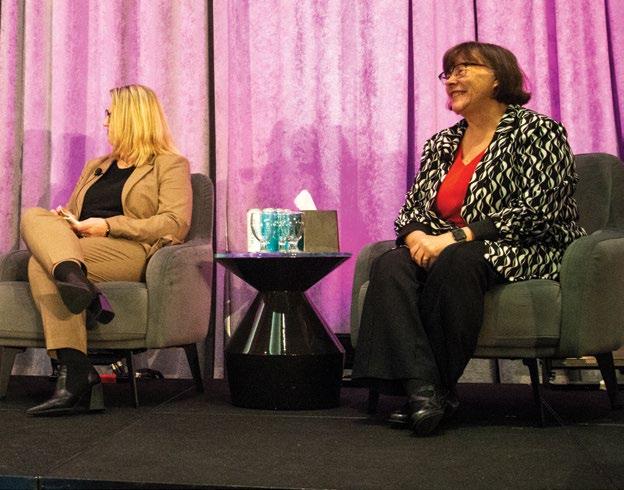
own, so I have been constantly re-committing myself to the hard work of getting more women into positions of power and influence.”
The morning keynote from Carolyne Doyon, president and CEO of Club Med, followed. Her talk highlighted her personal journey as a working mother who overcame challenges and successfully integrated work-life balance while rising to leadership, with the goal of inspiring the next generation of female leaders by demonstrating that leadership is not about perfection but about growth, resilience, and support.
The last panel of the day, moderated by Katie Taylor, former Chair, Royal Bank of Canada, and former president & CEO, Four Seasons Hotels & Resorts, featured Lydia Chen, president & CEO, InnVest Hotels; Shazma Charania, president, ZS Holdings; Keryn Houston, director of Catering and Club Restaurants, Maple Leaf Sports & Entertainment (MLSE); and Susan Senecal, president & CEO, A&W Restaurants.
Together, the panellists explored the multifaceted dimensions of female empowerment, leadership and collaboration in today’s rapidly changing world.
The panellists talked about some of their biggest challenges and how they’ve overcome them, and offered advice to their younger selves.
The conversation switched gears to focus on technology and how the panellists are leading their teams through these tech transformations.
“Technology is one of the most critical forces shaping our industry right now and MLSE is all-in on tech,” said Houston, highlighting the recent multi-million dollar Re-Imagination Project at the Scotiabank Arena. “It’s a venue that’s technology enabled, but not necessarily technology led. But, on any given day, my team and I will work with no less than 10 systems that help us manage our business. With every new system we launch, there has to be a strategic roll-out plan, such as in-class learning or modules to help our team understand and move forward.”
Next, Senecal and Chen discussed how they approach the integration of work and life and what’s helped her show up as her best selves. Senecal said she makes sure that work is meaningful, not only to herself, but to everyone on her team, while Chen said that taking time for self-care is important to her.
The panellists also talked about overcoming barriers, celebrating achievements and fostering inclusive environments that elevate women’s voices.
In the first morning workshop, Reetu Gupta, Ambassadress, Easton’s Group of Hotels moderated an entrepreneurship panel featuring Heather Cameron, head of Brand and Creative, DoorDash Canada; Sarah Sklash, co-founder, The June Motel; Connie DeSousa, co-owner
and co-executive chef, CHARCUT; and Komal Jafri, regional manager, Central Canada SBB| Women in Enterprise, TD Bank. The group of successful female entrepreneurs shared their personal journeys, highlighting the challenges they faced and the innovative strategies they employed to overcome obstacles.
Cameron highlighted how DoorDash is helping entrepreneurs grow and thrive through the company’s Entrepreneurship & Access Program, which provides opportunities for restaurant businesses owned by women, immigrants and people of colour through communications and support, increased in-app searchability, funding and marketing campaigns.
Conversely, DeSousa shared the importance of giving back to communities as an entrepreneur. Recently, DeSousa and her business partner John Jackson launched the CHAR Hospitality Fund, administered by the Calgary Foundation, to support charities, organizations and initiatives that help alleviate food insecurity; benefit women experiencing poverty who want to pursue careers in foodservice; and promote mental health awareness.
The panel also covered funding, networking, finding a mentor, balancing work-life dynamics, and showcasing the achievements of women in business while also fostering a sense of community and support.

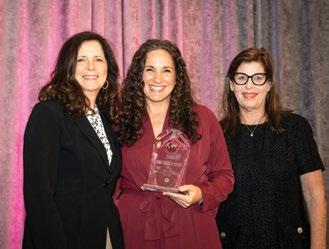
The morning breakouts also included a session dedicated to the mental health and wellness of women, gender nonconforming and non-binary people in the restaurant-and-hotel industry. Hassel Aviles, workplace mental-health leader and advocate and executive director/ founder of Not 9 to 5, addressed the challenges and strategies for maintaining mental well-being while navigating the demands of a career.
Drawing from her own experience
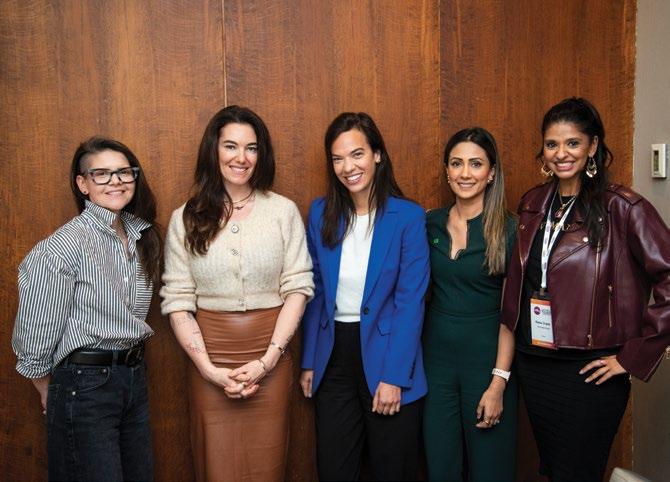
Two awards were presented during the day’s gala luncheon: the Katie Taylor Economic Empowerment Award, named after the summit’s honorary Chair, Katie Taylor, former chair of the Royal Bank of Canada and former president & CEO, Four Seasons Hotels & Resorts, and the Gender Equality Award.
The Katie Taylor Economic Empowerment Award was presented to Anna Blue, president of the AHLA Foundation (bottom), the nonprofit arm of the AHLA, while Sysco Canada was named the winner of the Gender Equality Award. (top)
with mental-health challenges, Aviles’ session addressed the connection between DEI work and workplace mental health, along with the intersection of work and well-being. She also stressed the importance of leading with equity.
Data collected by Not 9 to 5 shows that two thirds of the industry still tries to keep mental-health challenges to themselves. “So that means that there’s really high stigma still,” said Aviles. “So, if you’re a leader, you need to focus on de-stigmatization. People still feel uncomfortable being vulnerable, and part of that is because there’s not enough investment in workplace mental health and in general well-being in the workplace.”
The afternoon kicked off with a luncheon keynote presented by Anna Blue, president of the American Hotel Lodging Association (AHLA) Foundation. The session, entitled Breaking Barriers: Challenging the Systems that Challenge Us, aimed to inspire women and men to understand the systemic barriers that hinder their professional growth. Blue explored the historical context of gender disparities and highlighted the crucial importance of women recognizing and confronting
the structures that hold them back.
During her keynote, Blue talked about language and meaning, the history of imposter syndrome and the importance of storytelling.
“The only reason we need to empower women is because men took that power away from them,” said Blue. “How many other groups do we say this about? None. But this is a business and we’ve bought into this idea that we don’t have any power. We’re not saying that we’re all powerful, we’re saying it’s up to men to decide when and how we empower women. That’s broken.”
Blue continued, “Our industry is missing a balanced narrative. Women are missing from the narrative of our industry, yet women make up about 60 per cent of hotel employees in North America.”
The afternoon breakout session on human trafficking, moderated by Irwin Prince, president and COO of Realstar Hospitality, focused on strategies for combating human trafficking in the hospitality industry. Panellists included Sandy Biback, founder of Meeting Professionals Against Human Trafficking; Lizzy Low, Business Events manager at Ottawa Tourism; and Julia Drydyk, executive director of The Canadian Centre to End Human Trafficking.
Members of the panel encouraged hotel operators to implement training programs for staff on identifying and reporting signs of human trafficking and to incorporate anti-human trafficking messaging and resources into event RFPs and destination marketing materials. Advocating for the implementation of mandatory signage and awareness campaigns in airports, hotels, and other transportation hubs across Canada was also highlighted. Improving co-ordination and data-sharing between law enforcement, anti-trafficking organizations, and the hospitality industry to better understand the scope of the issue and measure the impact of interventions was identified as one of the keys to eliminate human traffickers in hotels.
The day wrapped up with a fireside chat between Rosanna Caira, editor/
publisher, Kostuch Media Ltd. and co-founder WITHOrg and Sandi Treliving, mental-health advocate and director on the board of the CAMH Foundation. CAMH is the largest mental health hospital in the country, with 500 beds and a 24-hour emergency room. It’s currently in the process of a $500-million campaign raise, which Treliving co-chairs to build a research centre on the campus at the hospital.
Treliving shared her personal journey, insights, and strategies for fostering resilience and emotional wellness. Treliving’s brother’s mentalhealth challenges and the lack of treatment options were a driving force behind her path.
She stressed that the messaging to the public about mental health needs to be that “this is serious and if it’s in your family, don’t ignore it. If you had a broken arm, you would go and see a doctor, the doctor would be able to fix it. The brain is an organ, and organs get sick.”
She said the biggest challenge to changing the perceptions of mental health is misinformation. “We have a long way to go yet, because we haven’t spent enough money in research on the brain. If we had a portion of the funds going to cancer research [dedicated to] mental health and brain research, we would be further along than we are now.” ♦
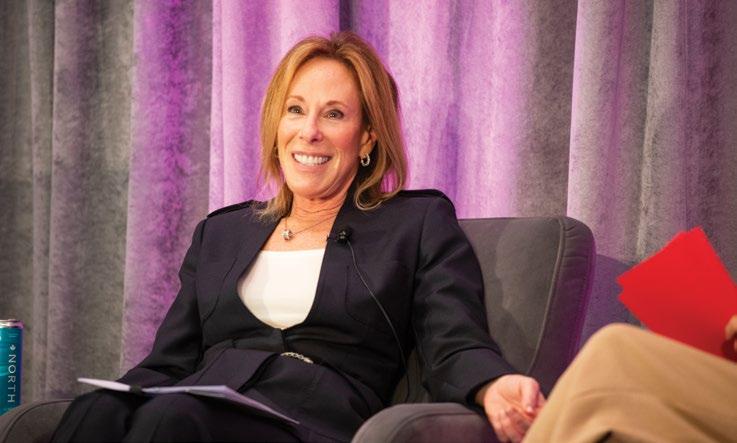

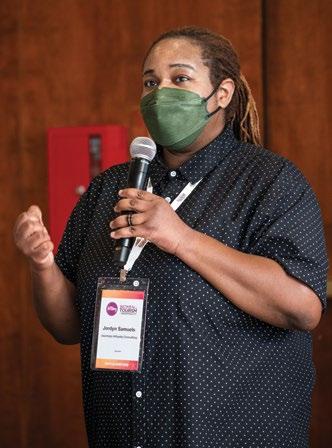
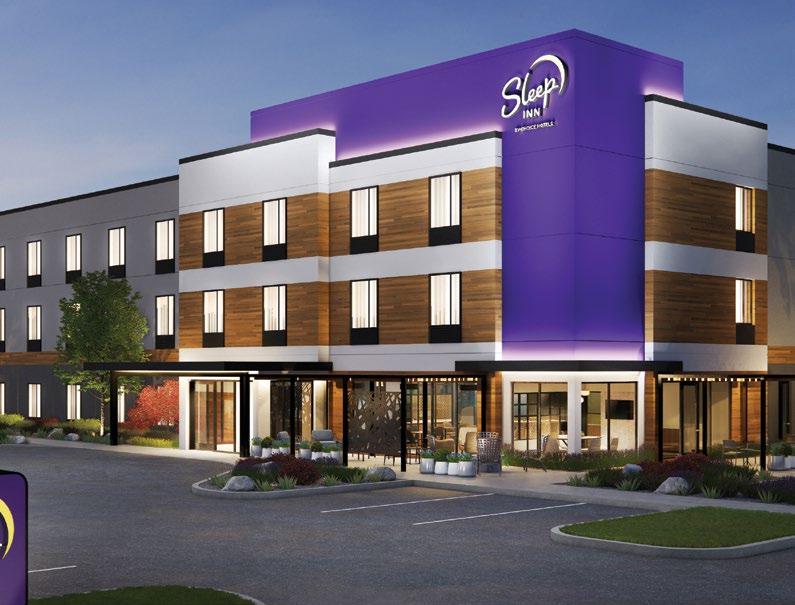
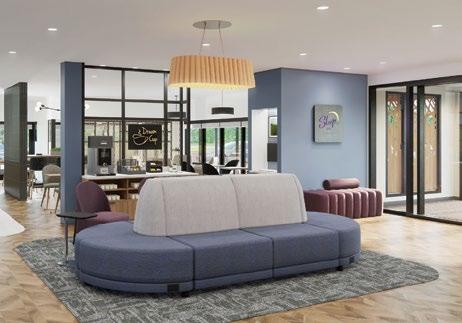

Your dream of building a new hotel is within reach. Join a growing community of hoteliers who have opened or are developing a Sleep Inn® — a unique midscale brand that balances the modern, nature-inspired look and feel your guests crave with the low development and operational costs your business needs to thrive.
Sleep Inn is a stylish hotel with the wellness-focused conveniences travellers of today and tomorrow prefer. Every inch of the Scenic Dreams™ Sleep Inn® Prototype & Design Package is designed for operational e ciency to help provide your best return on investment. And paired with Choice Hotels’ award-winning support, you’ll be set up for success from the start.
The Sleep Inn experience brings to life an uplifting design that is an excellent fit for any hotelier.






BY LAURA PRATT
The more a hotel knows about its guests, the better it can entice them to book and the better it can meet their needs on site. This illumination is facilitated with hotel market segmentation, a key component of a viable hotel revenue-management strategy. Market segmentation is the practice of categorizing hotel guests based on shared behaviour and characteristics, and it’s a fundamental piece of revenue management that extends its benefits to marketing, operations, and the guest experience.
Back in the day, hotels had a summer rate and a winter rate and they didn’t much mind who their customer was or whether they visited on a Tuesday or a Saturday. With market segmentation, instead of treating all guests the same, hoteliers can tailor marketing materials, guest communications, services and pricing to meet the needs and expectations
of each segment. Here, hoteliers collect guest information (at touchpoints before, during and after their stay); identify booking behaviour, including such details as city of origin, stay patterns, booking channels and preferred room types; determine their most valuable market segments (prioritizing those that generate high revenue and ADR); create guest personas to represent typical guests in each market segment; adjust their inventory management strategy; and develop pricing structures that acknowledge segments’ booking behaviour and price sensitivity.
Through this exercise, operators learn whether it’s millennials or Baby Boomers booking their rooms, and if they’re doing so to facilitate business or leisure travel. Hoteliers know that group guests — who typically book well in advance and reserve multiple rooms — behave differently from transient guests — who book anytime they please and typically reserve a room at a time.
Armed with this knowledge, along with guests’ travel intentions, preferred dates of stay, and even age range, gender and place of origin, hoteliers create packages and promotions that drive direct bookings, while enhancing brand recognition and maximizing revenue along the way.
IHG is a great practitioner of market segmentation, says Tarandeep Singh, regional VP of Commercial, Marketing & Revenue Management, Canada, IHG Hotels & Resorts. The company, which has aligned its market segmentation approach across all its global hotel brands, starts by exploring visit purpose.
“From there, we take a closer look at market segment data and the channels and timing guests use to book,” says Singh. “This information helps us create and refine our customer profiles in line with travel and stay needs.”
Going forward, Singh says the expansion of data will increase hotels’
ability to “conduct more in-depth behavioural analysis and uncover distinct guest segments based on demographics, booking trends and preferences.” Through better and broader data analytics, along with AI and other emerging technologies, he says, hotels “can anticipate activity and proactively tailor services and offerings. Ultimately, this knowledge inspires more personalized guest experiences and improved guest satisfaction.”
Singh believes hotel market segmentation — and the better understanding of guest behaviours, profiles and preferences it affords — offers several advantages for owners and operators in an increasingly competitive hospitality landscape. “This engagement can enhance the guest satisfaction and loyalty so essential to our growth and success,” he says, adding that segmentation also allows for smarter and more seamless operations through the implementation of dynamic pricing, ideally timed promotions and reduced costs per customer acquisition through more targeted marketing.
“Segmentation enables hotel owners to tailor offerings to different groups and expand their revenue capture potential,” continues Singh. For instance, hotels can emphasize efficiencies through co-working spaces, faster check in and check out, and loyalty rewards to attract business travellers while at the same time enticing leisure travellers through a reiteration of family activities, spa services or proximity to notable tourist attractions.
IHG, he says, also explores opportunities for potentially untapped or overlooked customer segments. An example is its engagement with airlines, highlighting potential needs for soundproof rooms, corridors and in-room dining to attract flight crew groups. And IHG acknowledges the prominence of sports travel throughout Canada with its recently launched IHG Youth Sports program, which targets this segment by anticipating the needs of parents, players, team organizers and event sponsors. This hotel behemoth also maintains partnerships with Esso and the Alberta Motor Association to catch the attention of Canadian road trippers.
In simpler times, Nooshi Akhavan,
director of Revenue Performance & Distribution at Coast Hotels, remembers guests fell into just a handful of buckets — at least according to operators’ understanding of them. Twenty years ago, she says, there were just four segments: transient guest (business and leisure weren’t divided then), group guest, tour and wholesale, and crew. “Today, I’ve seen hotel brands that have 18 market segments,” she says.
Hotel market segments can vary by property type, but now they typically fall into five categories: transient (guests travelling for business or leisure, who might be further divided according to categories such as OTAs, direct bookings and packages); corporate negotiated (business travellers whose employers have negotiated accounts with the property that reward minimum bookings with discounted rates and other benefits); groups (guests who reserve room blocks in advance at special group rates); wholesale (travellers who book through wholesalers who re-sell rooms to thirdparty retailers); and other (including independent travellers who don’t fall into other categories).
CoStar Group started tracking hotel guest segmentation in January 2002 to allow for deeper analysis of customer segments. “Hotels are sophisticated now when it comes to revenue management,” says Laura Baxter, director of Hospitality Analytics, Canada, CoStar Group. “And there’s some sophisticated software that allows this to take place. A well-organized hotel is definitely using segmentation and analysis to their advantage. If it has a certain amount of base business, it can set its rates higher, understanding that the pickup will be strong based on previous years.”
This third-party data provider offers a forward-looking predictive tool that looks at the past to predict the future while acknowledging what bookings are in the market at the moment — all with a view to supporting a hotel’s pricing. It tracks past business — essentially occupancy on the books per day and pickup — and issues forward-looking data for the next year. “Data points that suggest type of pickup or what future booking demand looks like in
the market gives hoteliers tools to make better-informed decisions,” says Baxter.
The channel from which a traveller originated plays into the equation now more than ever, given this characteristic’s ability to impact behaviour. It’s why Akhavan underscores the importance of understanding customers’ purchase paths.
“A channel direct is less cost to me than an OTA, so I’m trying to encourage them to come direct,” says Akhavan. “If we can understand each market segment and the channel from which they feed, we can put more energy into those channels. Managing them to maximize revenues for the day is hugely beneficial.”
The trick to mastering this part of the game, she says, is having a good revenue-management software system to see segmentation coming in, having a good business intelligence tool to let you know what channels are working and measuring those results regularly enough that you can anticipate the future. A revenue-management tool now allows operators to extend an almost unlimited number of rates that are reflective of guests’ history and length of stay, a property’s busyness and so much more.
The expanded view has expanded business. “If you had a summer/winter rate and nothing else, and it didn’t matter who your customer was, your revenue was capped out; you couldn’t go beyond that,” says Nicole Nguyen, SVP, CBRE Hotels. “Now a hotel has recognized that, if a guest wants to stay on Saturday when it’s hard to get a room, it can charge $5 more and that $5 goes directly into its pocket.” Like dynamic pricing on airlines and ride-sharing apps, hotels can earn incremental revenues that drive incremental profits.
Many RMS tools are no brainers, says Nguyen. “You plug it in and it more or less operates on its own.” Some are decision-based systems that make and push through rate decisions based on historical data. Others are merely suggestion tools, inviting the hotel’s revenue manager to take the lead.
Going forward, Akhavan believes, AI will play an expanded role in guest assessment. “Technology is catching up to the hotel industry and hoteliers are finally paying attention.”♦
Carefully curated, elegant and unmistakably a cut above.
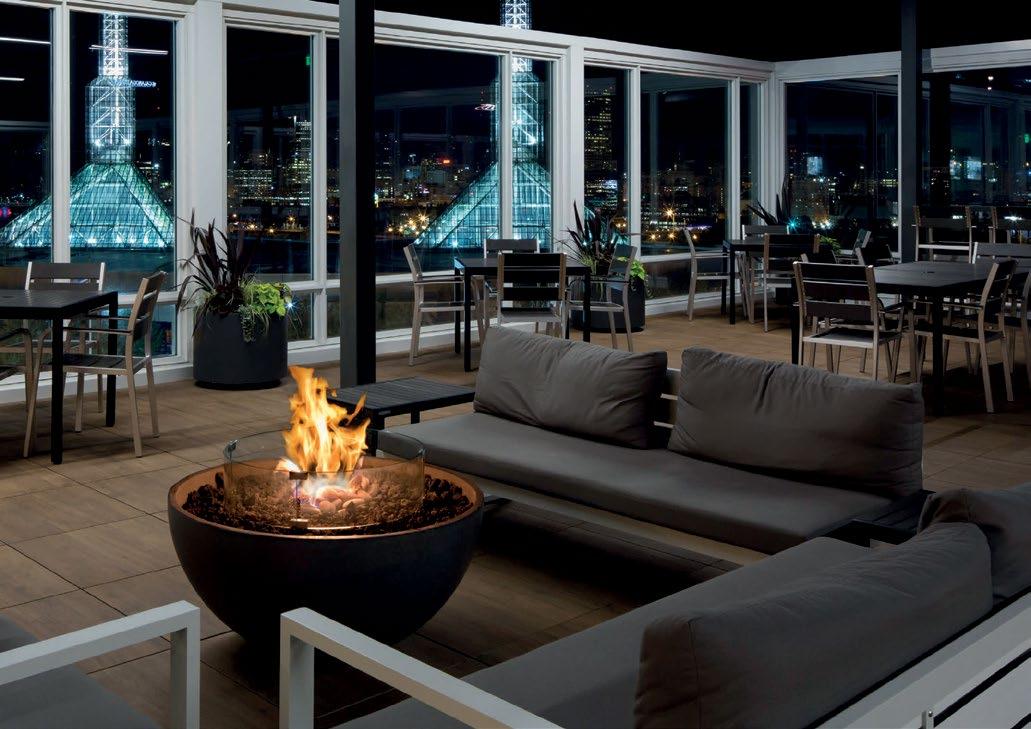

Boutique hotels may be small, but they’re mighty, too
BY ROBIN ROBERTS
BBOUTIQUE HOTELS have long attracted travellers who prefer a small, charming, unique property with an emphasis on personal, intimate service. According to Future Market Insights Inc., the sector in Canada is forecast to grow more than seven per cent through 2034.
Boutique hotels typically set themselves apart through their personalized service; greater attention to design and decor, often by local craftspeople; art that reflects the culture or history of the city where they’re situated; and sustainably and locally sourced food. The hotels are generally smaller, independently owned, often located in fashionable districts, and exude a distinctive personality and character.
Because of their smaller size, fewer rooms and higher staff-to-guest ratio, boutique hotels can offer a more personal touch.
“For most reservations, guests receive handwritten welcome notes thanking them for their business and asking them to contact me
directly if I may be of service during their stay,” says Jeremy Roncoroni, general manager of Vancouver’s St. Regis Hotel, adding management is free to create customized service such as cookedto-order breakfast, in-room amenities based on guest preference, and curated recommendations for local dining, events, and experiences.
Alexandre Cossette, Marketing director for Montreal’s Hôtel William Gray, says the staff collaborates with local brands and cultural figures so guests can immerse themselves in the city’s vibrant arts scene.
“We partner with Igloofest, a major Montreal winter festival, to offer guests exclusive experiences,” says Cossette. “We also work with fashion brands like Le Cartel and Pajar to highlight Montreal’s unique style. And, we’re collaborating with Philippe Fehmiu to curate custom playlists that feature local artists, enriching the hotel’s atmosphere.”
Jeanette Costa, SVP of Sales and Marketing for Crescent Hotels & Resorts, says the company’s properties, which include the Varscona Hotel on
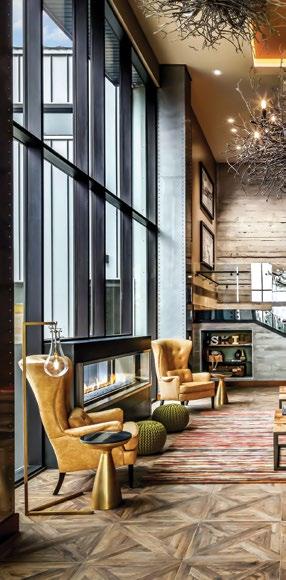


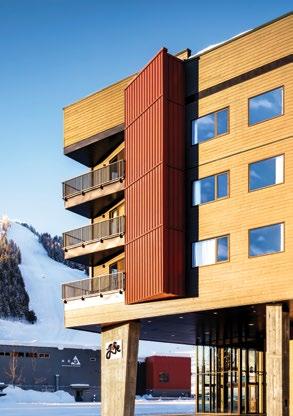
Whyte in the heart of Edmonton’s historic Old Strathcona district, offer a personal touch through customizable welcome gifts such as artisan chocolates, specialty drinks, or handmade crafts. Guests can also choose their own in-room music playlist and scents.
Crescent will also assemble a customized itinerary based on guest interests, such as private art studio tours, immersive cultural workshops, or off-the-beaten path hikes led by local guides and adventure companies. The Josie Hotel in Rossland, B.C., for example, arranges tours that highlight the area’s gold rush roots.
Future trends for this sector include offering company retreats featuring bespoke team-building or wellness experiences that incorporate a property’s unique grounds, gardens, woods, spa facilities or yoga patio.
To achieve the personality and originality inherent in boutique hotels, Vancouver-based Ste. Marie Art + Design has devoted an entire team to concept and envisioning.
“We look for narrative and anecdotal stories [to get] an authentic connection to the space,” says Craig Stanghetta, partner and creative director, Ste. Marie Art + Design. “We ask about an owner’s standards, values, niche, what makes them singular, what defines them
and their story. Then, we use our imaginations to interpret that and be as creative as we can.”
Stanghetta points to an example of the firm’s imagination at work in an upcoming Vancouver property once occupied by a manufacturer of mid-century modern lights. To highlight that history, his team is salvaging reclaimed architectural pieces to graft into the space.
“Additionally, if there’s a deep colour story, we either create a custom art program or work with art consultants to enhance and define the narrative that can and should only exist in that one place. It could be tile, hardware on a door, or [particular] signage,” says Stanghetta.
Roncoroni says designer Elaine Thorsell of BOTI Interiors worked alongside owner Rob Macdonald to create the historic look of the St. Regis. “The guestrooms blend heritage real wood furniture with contemporary muted tones for a timeless feel of refinement. The collection of original artworks was procured by our consultant David Cook and each piece was picked by the owner and designer.”
For Montreal’s William Gray, the focus was on melding history and modernity to reflect the stylish city. “Housed in two restored 18th-century buildings, the hotel offers a strong connection to the city’s heritage while providing guests with an authentic experience,” says Cossette. “The hotel also features a curated art collection, showcasing international and local artists that reflect Montreal’s vibrant art scene.”
Crescent’s Josie Hote collaborated with architect Song Chia of FAB Studio and Kimberly Miller of Design DMU to move the mountains inside through earthy tones, rich panelling and coffee tables made from recycled local wood by Rossland, B.C. woodcraftsman Lloyd Henderson.
Historic details, such as mining photos, maps and artifacts, as well as subtle flecks of gold throughout the hotel, reflect the region’s mining heritage. Two refurbished chairlifts from Red Mountain decorate the hotel lobby as an homage to the popular ski town.

Adele Rankin, managing principal and global design lead for CHIL Interior Design in Vancouver, says, “There’s a balance to strike between expressing the concept so that the guest can understand it and making sure you aren’t doing too many themes. The key is to have those memory points that guests can take with them.”
With The Dorian, Autograph Collection in Calgary, for example, Rankin and her team used custom lighting design and strong, saturated colours in fabric and wall coverings to conjure the Victorian era of Oscar Wilde’s famous novel The Picture of Dorian Gray. They even created original art and millwork that highlight the fractured mirror from the climax of the book. At the Delta Calgary Downtown, CHIL designed lighting in the style of a large custom canoe that hangs over the hotel’s Shoe & Canoe Public House to honour early cartographers who navigated and mapped trade routes by canoe.
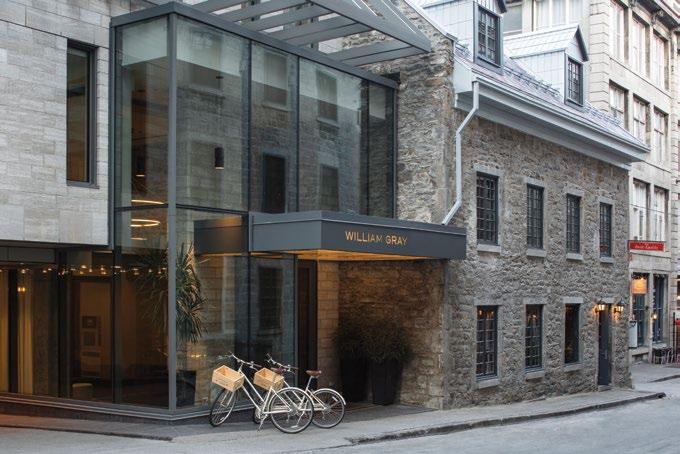
Most travellers are increasingly choosing hotels with strong sustainability commitments and green initiatives.
“We source chemicals that have minimal effect on the environment,” says Roncoroni. “We have a strong recycling program to support our complimentary FIJI water, and we sort all other waste. In 2022, we moved from individual plastic, personal-sized bottles of L’Occitane products to L’Occitane dispensers, equating to a reduction of roughly 80,000 plastic bottles per year.”
Hôtel William Gray’s sustainability practices include energy-efficient lighting, water conservation, and recycling programs. “The hotel also sources local, seasonal ingredients for its restaurants, and in-room amenities are eco-friendly, with a focus on reducing single-use plastics and minimizing waste,” says Cossette.
Just because boutique hotels are typically small doesn’t mean they can’t be big on technology.
“We recently introduced swipe-room entry, wireless phone chargers, Nespresso single-brew coffee systems and Chromecast enabled TVs,” says Roncoroni. “This year, we replaced all of our exterior electrical signs, including our iconic St. Regis neon sign, with new, low-draw LED fixtures made from recycled materials.”
Cossette says the Hôtel William Gray has integrated a chatbot that assists guests throughout their entire journey. “Before booking, the chatbot provides information about rooms, amenities, and special offers. It can assist with pre-arrival arrangements, such as dinner reservations or spa appointments. And, during a guest’s stay, the chatbot offers real-time access to room service, housekeeping, or local recommendations directly from their mobile devices. While we are strong believers in the importance of human service, we also recognize the need to adapt to the preferences of a new generation of travellers.”

lasting memories of their stay. Ambience, atmosphere and a unique sense of place are often what lingers with guests the longest, which is why design and decor are so important.
Above all, a boutique hotel should send guests home with
“We encourage the operator or asset owner not to repeat or mimic [other properties],” says Stanghetta. “When people develop their own standards of services, whether it be through food, music, art, activities and events, everything goes through that one lens and you end up being a place that is unrepeatable. That’s your way to stand out.”♦
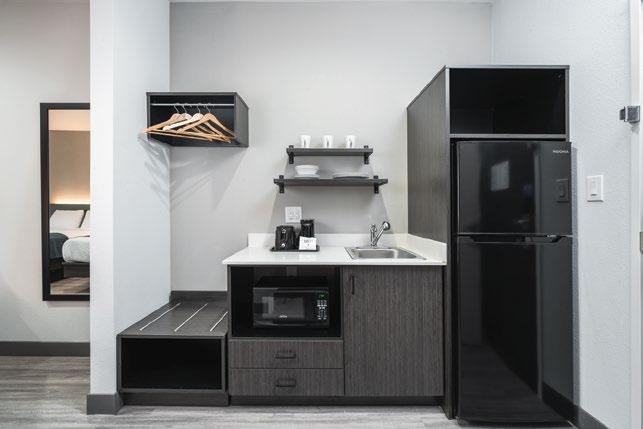

BY ERIC ALISTER
It goes without saying that Artificial Intelligence (AI) has unveiled to hotel and online-travel agency (OTA) brands the hidden powers of customer data collection for increasing operational efficiency and revenue. From improving personalized guest experiences to optimizing pricing, improving marketing efforts and enabling more accurate forecasting and better strategic planning, AI has proven time and time again that the more customer data you collect, the more valuable customer insights you will unlock. But that’s not where the story ends.
In this month’s technology segment, we continue examining data management by exploring some of the creative new ways that hotels and OTAs are putting their customer data to use.
Digital technologies produce a vast amount of data for hospitality and travel companies simply from their data collection throughout day-to-day operations. As AI technologies — such as machine learning, natural language processing and video recognition — continue to accelerate at a rapid pace, advanced analytics expert, Dilip Bhattacharjee,

expects OTAs and hospitality companies will soon be able to put their large volumes of digital data that they’ve collected to new and innovative uses. Bhattacharjee notes that, while it’s still too early to predict all the ways AI technologies will change the hospitality sector, a number of new opportunities are starting to emerge.
One of AI’s most powerful contributions to the hospitality industry is by helping operators shape personalized guest experiences. Companies can use data analytics to understand customer preferences and behaviours, allowing them to personalize room assignments, amenities and services, in addition to tailoring room preferences, suggesting local events and offering culinary choices based on past preferences.
But according to research conducted by media and predictive intelligence company, Hospitality Technology, AI will soon enable operators to see ahead of the curve by predicting what new guests will want before even the guests know it. Through predictive modelling, hotels could automatically adjust rooms to guests’ ideal temperature, arrange in-room amenities based on their interests or stock minibars with their favourite beverages. “It’s like having a crystal ball for maximizing
efficiency and wowing your customers,” says Bob Vergidis, founder and Chief Vision Officer of pointofsale.cloud.
Based on the latest insights from CBRE, we’re beginning to see partnerships across a much broader range of industries. Such partnerships allow for the companies involved to consolidate their collected customer data to make more informed predictions. Hilton and Extended Stay America, for instance, recently partnered with Target, Restaurants. com and DoorDash to improve instant discount and points redemption across their platforms. According to CBRE, seventy-eight per cent of U.S. hotels are affiliated with approximately 328 brands. Furthermore, the six hotel-brand families tracked in CBRE Hotels’ 2023 KPI database owned 21 brands each on average, representing almost 60 per cent of all branded U.S. hotels.
As a hotel or OTA, the advantage of having more partnerships under your belt means having access to more customer data, collected from a more diverse range of products and services. As CBRE pointed out in its July 2024 AI’s Impact on Hotels report, partnered companies can share between them such valuable customer data as “where you

live and when you go on vacation, what types of places you researched and chose not to go to, when your anniversary is, when your kids were born, who your friends are and even what you ate last night.” Armed with this data, OTAs can utilize AI to predict the right place for a customer to visit, at the right time and at the right price.
For hotels, the benefits can translate into determining price based on the guest rather than the room. Today, hotels don’t factor in the guest when pricing a room. Regardless of who is booking the room, the price stays the same. In the future, hotels can price a room differently based on who is booking it. Guests who have historically spent more at onsite amenities can be given steeper room discounts in order to maximize revenue.
The above mentioned trends make it abundantly clear that a company’s size is a large contributing factor to the volume and diversity of customer data it can mine, which in turn translates into more personalization that drive profits and revenue.
The AI era, therefore, will benefit the brands with the most partnerships, leaving behind the smaller companies. So start making new friends, fast. ♦



BY NICOLE DI TOMASSO
When a guest enters a hotel suite, they’re stepping into more than just a room — they’re entering a space that should feel like a luxurious retreat, a home away from home or an escape. With evolving guest expectations, designing a hotel suite is a multifaceted challenge that requires a balance of style, comfort and functionality.
“Travellers might think a suite is just a larger guestroom, but it’s much more than that,” says Shannon Kim, BAAID, IIDA, VP at Toronto-based Figure3. Toronto-based Figure3. “From a design point of view, a suite provides a layered experience. Unlike a standard guestroom, which focuses mainly on rest and relaxation, a suite typically includes a living space, dining area and kitchenette to offer that at-home feeling.”
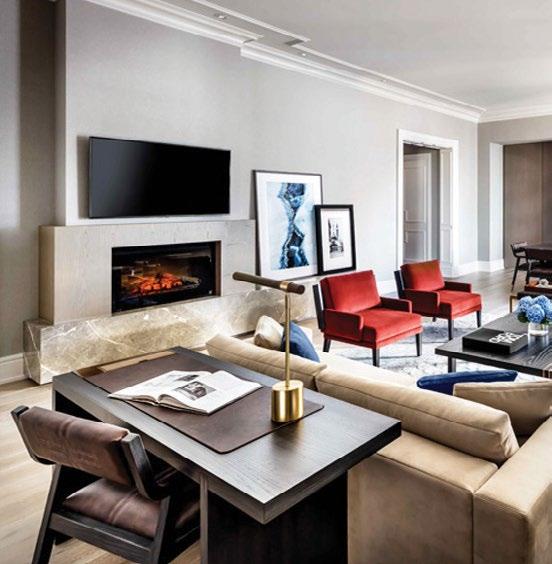
There are many different suite styles for travellers to choose from, such as junior suites, executive suites, presidential suites and penthouse suites to name a few.

Residence King, Fairmont Tremblant

Fairmont Tremblant recently announced the completion of another phase in its extensive renovation project with newly revitalized guestrooms and suites. Designed by Toronto-based Design Agency, the renovated Residence Suites offer 530 sq. ft. of living space, which expands to more than 850 sq. ft. when connected to a View Room, creating a luxurious two-bedroom condo.
With fully equipped kitchens and living areas that boast views of Mont-Tremblant, the suites provide an ideal retreat for families or extended stays. Additionally, many of the Residence Suites can be connected to an extra room, offering added space and flexibility for larger groups.
“Our renovation of the Hotel Residence Suites reflects our commitment to providing an unparalleled guest experience, blending comfort and luxury in a stunning setting for guests seeking extended stays,” says Anne Marie Johns, general manager, Fairmont Tremblant. “We’re excited to welcome families, couples, and our corporate groups to enjoy these suites, where breathtaking views and thoughtful amenities come together to create memorable experiences.”
These options cater to diverse traveller types, from business travellers to families seeking a more refined stay.
“It all depends on the type of hotel and its location,” says Tatiana Sheveleva, partner, Toronto-based Chapi Chapo Design and owner, Chapi Design Inc. “At resort hotels, suites are more family focused, while urban hotel suites cater to both families and business travellers.”
“There’s also executives travelling with their families on a re-location assignment, leisure guests looking for a more private and elevated stay, VIP/celebrity guests and honeymooners,” adds Kim.
A well-designed suite feels spacious and organized, requiring a layout that maximizes the flow of the movement and enhances the suite’s functionality.
“The layout of a suite can make or break the guest experience,” says Kim. “Positioning the bed away from the living space, for example, gives guests a sense of separation between work and rest areas.”
In August 2020, Chapi Chapo Design Inc. completed the re-design of all the St. Regis Toronto’s luxury guestrooms and suites. The hotel’s suite design allows business travellers to conduct meetings in a separate living room without compromising their privacy in the sleeping area.
“In the living room, there’s shelving for display and a TV in it with a concealed door, so the suite can be booked for private meetings,” says Sheveleva. “The dining table can also double as a meeting table, featuring hidden outlets, and can be extended to accommodate up to 12 people. Some travellers might prefer to have a more important business meeting in a quiet place as opposed to the hotel’s lobby, restaurant or business centre.”
Designers focus on avoiding clutter, strategically placing furniture and decor to emphasize a suite’s openness. Additional multi-purpose furniture, such as fold-out desks, built-in closets, sofa beds and storage ottomans, can help optimize limited space while maintaining a luxurious appearance.
One essential feature in high-end suites is privacy, especially in
shared spaces or family-friendly accommodations. Designers often incorporate partition walls, curtains, or sliding doors that separate the bedroom from the living area, allowing for privacy and flexibility without sacrificing space.
“Subtle zoning, which is achieved with rugs and small partitions, ensures the room feels more purposeful without being cluttered,” says Kim. “A good layout needs to flow seamlessly, balancing openness and privacy.”
Lighting is crucial in shaping the mood of a suite. Designers use layered lighting to achieve a cozy yet practical effect. A combination of overhead lights, task lighting by the bed and desk and ambient lamps create a versatile environment that adjusts to the guest’s needs, whether they’re working or unwinding.
“I’m very conscious about lighting. Women love to have proper lighting, especially when doing their makeup,” says Kim. “Dimmable LED with layered lighting schemes are effective rather than just one type of light in one space. I like to use ambient lighting and PESCA decorative lighting combined to create a dynamic space that can shift from day to night.”
In addition to energy-efficient lighting, many suites now incorporate water-saving fixtures, recycled and reclaimed materials and biophilic design elements (characteristics of the natural world found in a built environment) to add character to the suite while promoting sustainability.
“Low-VOC (volatile organic compounds) paints are ideal for large hotel structures where oftentimes the windows aren’t operable,” says Isabelle Boba, founder and CEO of Torontobased LUX Interior Design. “If a toxic paint was used instead, it could take years before those volatile organic compounds are actually out of that environment.”
Boba continues, “We use a lot of wood, even for wall features. When you purchase wood from Canada, that wood is acclimatized to our climate, so not only are you saving on transportation costs and limiting fuel emissions, you’re maintaining the quality of the material
in its own landscape,” adding that importing an exotic acacia wood, for example, needs to be handled and cured correctly for a long period of time in Canada so it can understand the climate before installation or else it can start to crack during the colder months.
As guests have become more accustomed to smart technology in their homes, they expect the same level of convenience in hotel suites. High-end suites often feature smart home integrations, allowing guests to control lighting, temperature and entertainment systems through a single device or even their smartphones. For business travellers, charging stations and high-speed Wi-Fi are must-haves. Some suites go a step further with voice-activated assistants, keyless entry and customizable in-room experiences.
The best designs incorporate these high-tech features seamlessly, allowing guests to interact with them effortlessly without interrupting the overall aesthetic.
“The days of pressing a lot of buttons are gone,” says Kim. “The simpler, the better. This adds to the convenience of making a space more personalized and future forward.”
As the world of travel continues to evolve, hotel suite design is likely to follow suit, blending comfort, luxury and technology with a strong sense of sustainability and cultural authenticity. In the coming years, we can expect even more emphasis on creating customizable spaces where guests can adjust the ambiance, decor and amenities to match their preferences.
“I’m focused on creating something that’s more timeless than trendy,” says Sheveleva. “When you pay attention to the small details, the design can become quite beautiful and unique. Every design is unique to a brand, a property and a location. Every project starts with a story and we try to implement that story into various design details.”
“In order to be progressive as an interior-design firm, you always need to pivot and push boundaries,” says Boba.◆


Developing F&B programming that resonates with guests is rife with unique challenges
BY DANIELLE SCHALK
rafting effective food-and-beverage (F&B) programming is a balancing act that poses unique challenges for hotel teams. A chief challenge among these is the speed at which trends, guest expectations and market conditions change.
“The rapid market evolution requires agility and foresight. Sometimes there’s a short lead time to understand new trends, and in order to stay relevant, you need to stay a step ahead,” notes Wouter Aarts, director of Operations for the Fairmont Empress on Vancouver Island. Beyond that, “many internal and external stakeholders are involved when developing our F&B strategy, and we need to ensure we’re understanding the evolving market and our guests while staying true to our own DNA. We must find a balance between coordinating traditional and contemporary offerings to meet diverse guest preferences while staying attuned to emerging trends.”

The rapid market evolution requires agility and foresight. Sometimes there’s a short lead time to understand new trends, and in order to stay relevant, you need to stay a step ahead
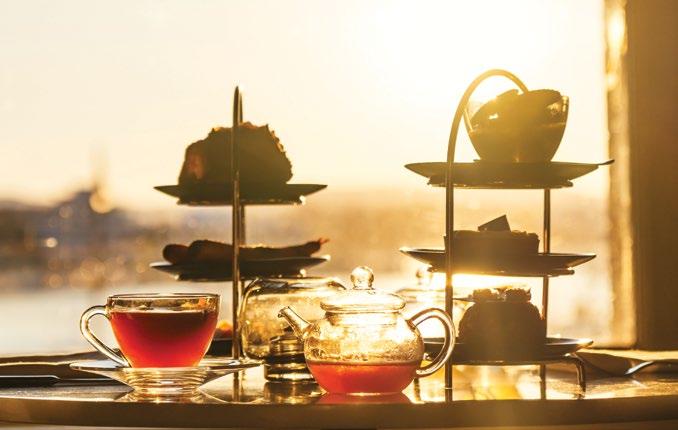
support local partners and shortens delivery times, while also reducing carbon emissions.”
“New trends in the food-and-beverage realm emerging on social media can shift the expectations guests have,” explains Kunal Dighe, dual property executive chef at JW Marriott Parq Vancouver and THE DOUGLAS, Autograph Collection. “At [both properties] our teams work to create programs that are timeless while infusing newly emerging approaches where it makes sense to do so.”
Current economic conditions have also created challenges. As Daniel Craig, executive chef at The Westin Harbour Castle, Toronto, explains, “Inflation has posed a challenge for us. It's difficult to meet strict budgets while trying to maintain profitability and deliver highquality ingredients.”
To address these conditions, Craig notes efficiency is key. “We aim to work as efficiently as possible with our food products and teams by minimizing waste, using effective time management and ensuring we’re reaching our goals,” he explains.
And, importantly, cost isn’t just measured in dollars or man hours. “It’s important to balance the costs of a food-and-beverage strategy while striving for excellence and meeting guests' needs,” notes Dighe. “We work with local suppliers and vendors as much as possible, ensuring fresh and locally sourced ingredients are incorporated into our menus. This allows us to
Aarts also highlights sustainability and environmental stewardship as key factors shaping offerings at the Fairmont Empress. “In an ever-evolving market, where trends and influence shift rapidly, sustainability has become a key focus to ensure long-term growth and viability,” he explains. “While meeting consumer and business demands, we must be cognizant that our business practices align with our sustainability initiatives.”
To help manage these numerous influencing factors, many teams are turning to technology and data to ensure they have a clear view of their F&B operations and inform their decision making.
For example, Dighe’s teams leverage data on guest meals, number of guests and food consumption from previous events hosted on site to help inform and elevate the hotels’ offerings.
“The utilization of revenue optimization tools helps us to better understand the data behind guests’ behaviour and spending to continuously evolve our offerings in the venues,” Aarts agrees. “In turn, this helps us to appropriate our cost and expenses that the business brings, without this being at the detriment of the guest experience.”
As part of this pursuit, Fairmont Empress has employed new technology to help meet sustainability goals, as well as optimize operations.
“We recently introduced Orbisk to our hotel — an AI tool that tracks and analyzes food waste in real time,” says Aarts. “We now identify patterns and
make informed decisions about reducing waste, ultimately contributing to our sustainable objectives and implementing cost-saving measures.”
As Craig shares, a number of technology-driven solutions are currently being considered by The Westin Harbour Castle, Toronto team. “During a Marriott Global culinary call with chefs across North America, it was discussed that AI technology would be introduced to help with inventory management and food-waste reduction. We’ll continue to explore this further,” he explains.
Another avenue being explored is assisted cooking. “The team has considered using AI to assist with accurate precision cooking,” says

New trends in the food-and-beverage realm emerging on social media can shift the expectations guests have
Craig. “AI technology could monitor numerous aspects of the cooking process with specialized sensors and machine-learning algorithms.”
However, amid all the excitement of optimizing an innovating, it’s also important not to lose sight of what drives F&B business — the guest. Ever-shifting guest needs and expectations create a need for regular assessment and adjustment.
and located efficiencies in our labour model,” Craig explains. “We utilize one bartender who can handle multiple checks as opposed to one server for each section.”
At the Fairmont Empress, Aarts points to a desire for experience as a key trend shaping the Vancouver hotel’s F&B strategy. “Today’s guests expect more immersive and memorable experiences, integrating design, ambiance, service rituals and sensory elements. As a result, our F&B programs are expanding to offer innovative and engaging options in a competitive market,” he explains.

From his position in Toronto, Craig notes, “We’re finding that guests are focused on their health and well-being and are more conscious about their food sources, as well as sustainability. There has also been a rise in solo diners who prioritize convenience, speed and efficiency — most times opting for a quick meal at the bar.”
And, after noting this change in behaviour, The Westin Harbour Castle, Toronto team adjusted how it serves guests to take these single diners into account. “To accommodate this, we have doubled our bar seating
As an example, Aarts points to the hotel’s Sunset Sips program. This recently introduced offering draws inspiration from the experience created by the Empress’s Afternoon Tea program, which draws more than 400 guests daily during the summer.
“[For Sunset Sips] we serve signature teainfused cocktails and mocktails in glass teapots and teacups, accompanied by tiers of savoury bites,” says Aarts. “The spirited tea time invites guests to transport back in time to the prohibition era (1920s), while watching the sun set over the city’s Inner Harbour.”
Overall, Dighe explains, F&B program development is always an ongoing process. “Ensuring that a food-andbeverage strategy will remain exciting, current and timeless is a challenge; however, it’s one we welcome as it empowers our culinary team to be creative and inventive,” he says. ◆
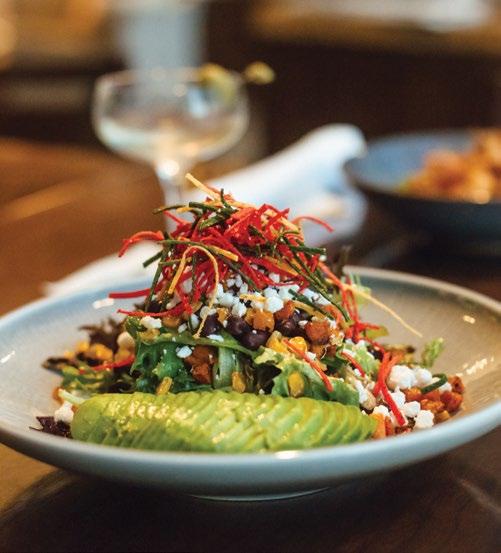
Local partnerships with producers, brands and organizations can enhance F&B programs with authentic local flare.
“Partnering with local producers enhances the guest experience by introducing them to unique, regional flavours,” says Wouter Aarts, director of Operations for Vancouver’s Fairmont Empress. “Collaborations with local honey producers, fisheries, distillers and Indigenous Nations for our salmon supply enrich the authenticity of our offerings.”
At The Westin Harbour Castle, Toronto, executive chef Daniel Craig and his team are also passionate about highlighting the producers they work with.
“Every single partnership tells a story, and our guests love to hear it,” says Craig. “We highlight our partners in our menus and occasionally have them speak at dinners to share insights about their production process.”
Partnerships can also be leveraged to create unique packages that highlight F&B offerings. For example, Coast Capri Hotel in Kelowna, B.C. has been running a B.C. Ale Trail - Sip & Stay promotion, highlighting beers from Virtue & Vice Brewing Co, which is located within three kilometres of the property. The offer gives guests a discounted room rate, two 16-ounce sleeves of Vice & Virtue beer upon arrival and the option to enjoy two flights of beer for the price of one at Vice & Virtue's tasting room.
Ryan Soderberg achieves success by being a
BY ROSANNA CAIRA
As the only hotel in North America located within a major league stadium — the Rogers Centre — the Toronto Marriott City Centre is a unique property that holds extraordinary appeal for the fans as well as travellers. And for Ryan Soderberg, its GM, that distinction makes his role that much more appealing.
“The hotel stands out as truly unique among properties I’ve worked at,” says the Calgary native. “Many guests tell us that staying here is a must on their sports bucket list. The layout is also distinctive, as the hotel wraps around the north, west, and east sides of the stadium, with fieldview rooms extending from the right to the left foul poles, offering unparalleled views of live baseball games below from the comfort of their hotel rooms.
Married with four children (two from his first marriage and two from his wife’s first marriage), Soderberg has a busy life running the 348-room hotel (with 70 suites facing the baseball field, four private Skyboxes and 12,000 sq. ft. of meeting space for meeting/conference guests).
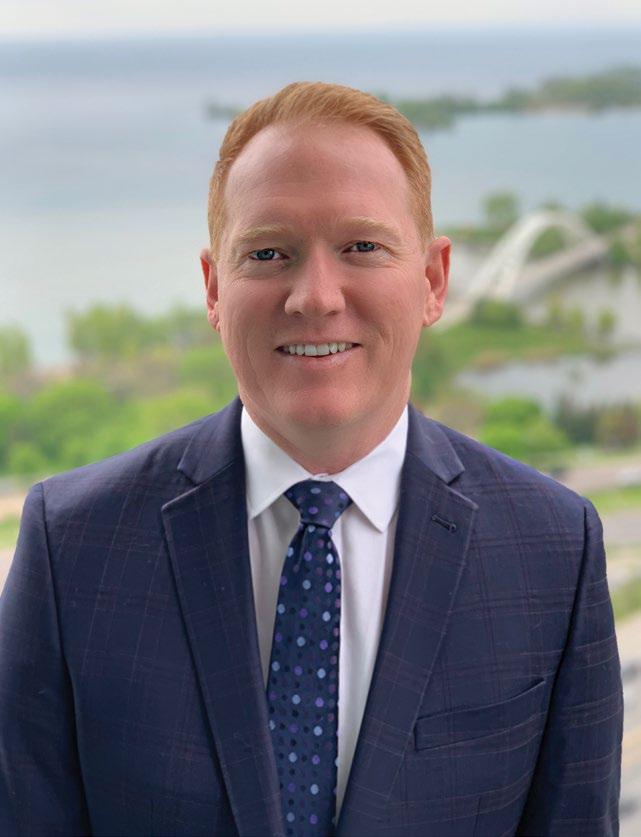
Though he originally wanted to be a phys-ed teacher, after earning a degree in Kinesiology, Soderberg shifted his sight to the hospitality industry and hasn’t looked back since.
“My first role in hospitality was with The Cosmopolitan Centre in downtown Calgary. From there, I moved on to my first hotel role as a Sales manager at the Westin Calgary, a job that opened my eyes to the endless interesting and rewarding opportunities available in hospitality.”
He’s been at the Toronto Marriott City Centre since February 2023. “In addition to being compelling for leisure guests, our location and event spaces make it a popular choice for business guests. Meetings can begin in our traditional event rooms but often transition into breakout sessions in the private boxes within the Blue Jays' outfield, which we can set up specifically for meetings with the best view ever, or for corporate gatherings. I've never worked at a hotel where sports, business, and leisure intersect in such a dynamic way.”
Leading the property comes with its own unique set of challenges, he says. “One of our biggest [challenges] is managing the fluctuating pace and energy levels that come with Toronto Blue Jays home games and major stadium concerts like Taylor Swift, Pink, or Billy Joel for example. Given our incredible location inside the Rogers Centre and F&B outlets like Sportsnet Grill and Starbucks that are destinations unto themselves, these events create significant shifts in guest volume and demands on our services, requiring us to adapt quickly and maintain a high level of responsiveness.”
Soderberg is proud of his team, which fluctuates between 225 and 290 associates, depending on the hotel season. “They know the hotel inside out and understand instinctively what needs to happen.”
As a Marriott property, the hotel’s culture is centered around people first — take care of your team and they’ll in turn take care of the guest. “We believe that intrinsically. From a customer-service perspective, we see ourselves as creators of memorable experiences. Every day, we strive to embody this commitment, living by the motto that drives us to deliver exceptional hospitality and lasting memories.”♦
Define your style
“My style is about striking a balance. I do this with strategic vision and hands-on involvement, emphasizing exceptional guest service, financial and operational efficiency, and a strong, motivated team culture.”
Service philosophy
“Imagine yourself as a guest. This doesn’t have to refer specifically to paying guests, but should also refer to co-workers. Everyone plays a role in making the hotel successful and we try hard to ensure they know and understand that.”
What keeps you up at night? “I have 225 to 290 associates and up to 500+ guests that I’m responsible for each day. Ensuring we’re always prepared to welcome and provide for them is top of mind.”


Check out the Checking In podcast to listen to conversations between editor and publisher Rosanna Caira and hotel industry leaders speaking about the issues impacting the dynamic hotel industry.









E51. HOTELIER INVESTMENT ROUNDTABLE
ROSANNA CAIRA EDITOR/PUBLISHER HOTELIER MAGAZINE
AMY BOSTOCK
MANAGING EDITOR HOTELIER MAGAZINE
E50. ATTRACTING TALENT DR. ALTAF SOVANI
Author, Educator, Entrepreneur and Founder | Alzen Consulting

E49. LABOUR PAINS










DAVID MCMILLAN President | Axis International
STEPHEN J. RENARD President | Renard International Hospitality Search Consultants
ADRIENNE FOSTER Vice-President | Hotel Association of Canada (HAC)


E48. STRENGTH IN NUMBERS
INGRID JARRETT PRESIDENT & CEO
B.C. HOTEL ASSOCIATION
CHECKING IN podcast episodes are available at hoteliermagazine.com/category/media/podcast/ or find them on and

